#another comparison: it's like if Annihilation had no brains
Text
So I watched Color Out of Space yesterday because I thought it would be bad and batshit and something that would serve as good knitting background.
Only it wasn’t bad.
(Still batshit and still good knitting background though.)
I don’t really know where to start talking about this but since I’m doing this for free, I’m going to talk about eggs benedict first. I love eggs benedict. If you don’t know what it is, the standard is an English muffin, with Canadian bacon on top of it, with a poached egg on top of that, and the whole thing topped with hollandaise sauce.
I can poach an egg sort of successfully most of the time. But my standard grocery shopping doesn’t include English muffins or Canadian bacon, and making hollandaise is a whole thing with raw egg yolks and either getting your blender dirty or whisking until your arm falls off and like…if I have enough time to make a breakfast of more than one step for myself (or if I feel like having breakfast for dinner) I’m also probably trying to chill that day. Also I’m already poaching a couple of eggs and that’s where the anxiety has to go.
So when I want eggs benedict at home, it’s going to be made with: whatever kind of bread thing I have, topped with whatever kind of meat I have in the fridge (I have used a sliced-up hot dog for this), topped with a poached egg, topped with not hollandaise, but something that will work for the purpose, made by stirring up mayo with lemon juice and a dash of cayenne pepper. I’ve never been disappointed with my results, maybe because I’m a gremlin? I wouldn’t serve any of this business to a chef, but I don’t make this to serve to a chef, I make this to eat it.
Maybe that will help you understand what I’m feeling about Color Out of Space. Some spoilers below.
In the first half-hour or so of the movie, I was flip-flopping about whether the movie was “self-aware” or not. Like, is the weirdness unintentional? Should I wince with secondhand embarrassment at the filmmakers?
I think the answer is firmly NO to these two questions. In fact, I think that the filmmakers were WILDLY SUCCESSFUL in what they intended to do.
There were several different things that convinced me that they were doing whatever they were doing on purpose, including all their deviations from the H.P. Lovecraft story the movie is based on.
1. Right at the beginning, there’s a bit of flirting between the hydrologist and the daughter of the family that lives on the farm where the meteorite will soon land. Yeah it’s heterosexual nonsense, BUT. The hydrologist is Black and the daughter is white. H.P. Lovecraft’s head is suitably exploded, now we can do whatever we want.
2. The dinner scene with the family where there’s a short conversation about how the daughter is always wanting fast food. Now, in context this is just to establish that she’s missing living in the city vs. in the middle of nowhere. But importantly, she’s the first character we see in the movie and so is kind of our gateway into this situation. And she doesn’t want the home-cooked meal, she wants the fast food, even after her mother points out the questionable ingredients. “I know,” she says. “But it tastes like heaven.” Sometimes you want fast food even though you know very well that it’s not gourmet. Not every horror movie has to be a perfectly balanced tour-de-force of suspense, mystery, and social commentary. You can relax. Come into the movie.
3. The first creepy phone call. The hydrologist is at his survey camp (? IDK why he was outdoors at night in this scene actually, mumble mumble fieldwork?) and he gets a garbled, static-filled phone call on what is obviously a modern smartphone. But when he disconnects, there is the clear sound of a DIAL TONE. To me, this is too bizarre to be an accident, especially because there are a number of other phone calls and disconnections in the movie, and none of them end with a dial tone. I think the filmmakers do know what it’s like to use a phone. (Though there is a scene where the daughter is trying to call 911 and tells her father in a panic that she can’t get a dial tone. IDK what that’s about. A genuine error? A moment that might as well have a label that says “nitpickers take pot shots here”?) Back to the hydrologist. At this moment, as a viewer, I’m still thrown off by the dial tone. It’s nonsense, and that makes it a “bad movie” marker, I guess, but someone had to decide to put the sound in. It couldn’t have happened carelessly. And then the hydrologist has to block a glare of light. He uses the book he’s been reading, which is “The Willows” by Algernon Blackwood—which was one of Lovecraft’s favorite supernatural stories. It’s very clear to the audience—not a lingering shot, but still something that’s not supposed to be an Easter egg.
And this is where I say, okay. The filmmakers know their source material. They know their audience. No one in the movie is winking at the camera, and the movie is yes, kind of funky, but it’s not made in a careless way or in a way that you feel that the filmmakers are inviting laughter. It’s horror—and believe me, they’ve got some practical effects in this one are truly ghastly—but it’s horror that exists very clearly in its genre and feels playful because of that.
Three things that show that playfulness to me: the name of the hippie squatter’s cat. The cat is named G-spot, which, in the movie itself is explained as an immature joke “a pussy named—” but even as I was groaning and thinking “that’s a terrible name for a cat” the part of my brain that knows more about Lovecraft than I care to is like, “but not the WORST name for a cat!” and I don’t know if the filmmakers expected anyone to be like “well at least the cat isn’t named ———” but that was part of my reaction.
The casting of Nicholas Cage. Nicholas Cage is/was kind of a meme on his own, and in this movie he plays the dad of the family that lives in the house the meteor lands by. And at a certain point in the movie, his accent goes a little weird and he starts acting more like the stereotypical asshole horror movie dad. I dismissed this as just a disappointment at first, like, this is bad acting and bad acting choices and bad writing happening to move the plot. But then he switches back to his previous established character, and after it happened again I realized that this was happening because of the alien color messing with his mind! Even after accepting that the movie was being purposeful, I was still caught up in the idea of Cage as a bad actor and the movie as a bad movie that I was fooled into missing the first signs of alien mind control! That’s meta.
The kid going full creepy child like, immediately after the meteor hit. Obsessive drawing, staring off into space, invisible friends, the works. But it’s not even a main thing. We never even get a full good look at what he’s drawing. There’s no scene where either parent stops and dramatically stares at it and we wonder “oooooh is it really real?” It’s definitely real and it’s causing worse problems by the minute. The kid has gone full creepy child, but there is OTHER SHIT that is ALSO URGENT. It amused me to have this trope be present but not central.
What else do I want to say? Overall this movie had very little downtime. It didn’t waste a bunch of time with people denying that anything weird was going on, or trying to make the viewer wonder if all this was real. It’s real and it’s fucking up your alpacas! The movie assumes that viewers know “The Colour Out of Space” and doesn’t tease us with any “what-is-happening-if-anything” tension. Of course it’s happening. Show us what we came to see.
I think what made it successful for me were the same kinds of things that make good fanfiction successful, which only makes sense as it is essentially a “The Color Out of Space” modern AU. The willingness to play with tropes, the assumption of viewer familiarity with the source, etc.
The effects were used judiciously, and if some of it just seemed like a light filter or two I have to say I don’t really care.
And I think that’s all for now. Oh, except that I want to mention, only the Black guy lived. The hydrologist was the one to narrate the opening and the closing, the only voice that spoke any words from the original short story. Whaddaya know.
#color out of space#this absolutely deserves to be a cult classic#another comparison: it's like if Annihilation had no brains#but not in a BAD way#(I love Annihilation)
35 notes
·
View notes
Text
Ready Player Two — Opening Cutscene & Chapter 0
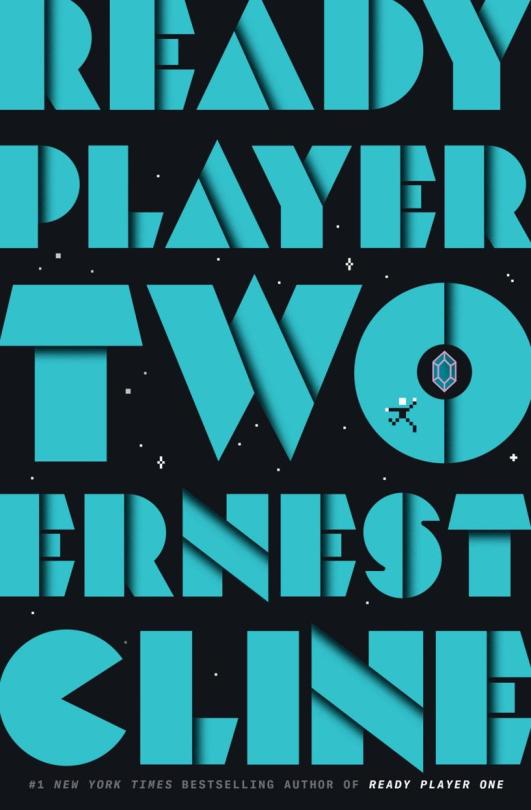
Hello again.

It’s been a while. I haven’t been active on this blog since, fittingly enough, Ready Player One. I was going to do this sooner—even had an alarm set up and everything—but then, it turns out, I’m feeling so much negativity about the world in general that a book just pales in comparison.
Seriously, I had to scrap this post’s entire intro because it’s not even 2020 anymore as I write this. And you know, maybe that’s for the best. I’m not really in the mood for doom and gloom and bitching anymore. I uninstalled Twitter from my phone a while back, I’ve been doing good at my daily writing sprints, my biggest fanfic project concluded on a positive note from people I didn’t even realize had been following it for years.
So I don’t know what this is going to be like. My commentary, I mean; I’ve heard echoes of what the book is like, so I’m not expecting a surprise there.
The book opens right after the end of Ready Player One, in a “Cutscene” where Wade recounts to us what happened after he won Halliday’s contest. It also assumes you remember exactly who the main characters of the book are, which is a bold move for a sequel that came out almost a decade after the original.
Technically, I could just look up the details I’m fuzzy about. But also, I think it’s more authentic if I don’t. I trust my memory enough that if I’m wrong, it’ll be in subtle enough ways that it’ll almost be a private jokes between all of us. An “if you know, you know” sort of error system. And I don’t think there’s anything more true to the spirit of this book than that.
Shoto had flown back home to Japan to take over operations at GSS’s Hokkaido division.
So Wade starts his tenure with nepotism. Wasn’t Shoto really young? Why is he qualified to run anything?
Aech was enjoying an extended vacation in Senegal, a country she’d dreamed of visiting her whole life, because her ancestors had come from there.
You know what, I’m not touching “send the token black character back to Africa.” This isn’t my lane.
And Samantha had flown back to Vancouver to pack up her belongings and say goodbye to her grandmother, Evelyn.
Why is she saying goodbye? Why, she’s moving to Columbus to be with Wade, of course! It’s not like there was anything else in her life. Was there? And why isn’t she referred to as Art3mis? I’m pretty sure Wade found out all of their offline names in the last book, and the inconsistency mildly bothers me.
These three sentences are back to back, by the way. Someone—I forget who—once described Ready Player One as a book that’s fun to write a wiki about, because it’s got fun concepts to summarize about until you realize that all the emotional connective tissue you need to turn a list of things into a story is missing, and that’s roughly how this first page feels.
Hell, the first line of the book is Wade telling us he remained offline for nine whole days after winning the contest, but by the end of the second paragraph we’re already to him logging back into the OASIS to "distract himself from [his and Samantha’s] reunion.
I’ll give Ernest Cline one thing: it feels like he wrote this opening nine days after the first book and did about as much maturing as a teenage boy would do between the two books.
Way more time is spent describing Wade’s OASIS rig, or the in-game planet where the climax of the last book happened, than anything else in this introduction. He is immediately greeted by a crowd of adoring fans who have been waiting over a week for him to come back in the game, because they’re all grateful that our protagonist and his friends restored their avatars after they were annihilated by the Sixers.
You’d think the adoring fans would serve some kind of purpose, or that something would happen, but no. Wade immediately goes “ew, people” and teleports away, since he essentially has ultimate powers within the game. With a caveat: the powers are actually coming from the Robes of Anorak he’s wearing, and I’m mentioning that in the hopes that it will pay off sometime in the book’s future, assuming Cline at least learned to do that. But still, let’s not skip too fast the fact that we introduced that crowd of adoring fans for no other purpose than to tell us they’re out there, because it fits right in with the last book’s attempts at saying as little as humanly possible in as many words as possible.
Anyway, Wade went back into Anorak’s study, where he arbitrarily checks out the Easter Egg he got at the end of the last book, and finds an inscription on it. I was dreading another riddle, but no, it’s just straight-up instructions to a vault in the GSS archives, so Wade logs off and goes to check it out.
Of course Halliday had put [the archives] [on the 13th floor]. In one of his favorite TV shows, Max Headroom, Network 23’s hidden research-and-development lab was located on the thirteenth floor. And The Thirteenth Floor was also the title of an old sci-fi film about virtual reality, released in 1999, right on the heels of both The Matrix and eXistenZ.
I’m equally shocked that it took two whole pages (on my ereader) to get to the first slew of references, and that one of these references is from 1999. I didn’t know we were allowed to think of anything that isn’t the 80s. Speaking of which, I’ll spare you the whole paragraph, but the book does feel the need to explain why it’s vault 42.
Inside the vault, there’s another egg containing a super-fancy and advanced OASIS headset. The egg also has a video monitor that plays a video message from James Halliday shortly before his death.
But despite his condition, he hadn’t used his OASIS avatar to record this message like he had with Anorak’s Invitation. For some reason, he’d chosen to appear in the flesh this time, under the brutal, unforgiving light of reality.
That oh-so-important message? An infodump about the headset’s working. He called it an OASIS Neural Interface, ONI for short. It basically lets you experience the OASIS through all your senses with sensory input just like the real thing, you know, that thing Wade had to get a fancy suit and massive rig to do in the first book. And yes, Wade does spend a paragraph or two comparing it to other works of science fiction. Of course he does.
More importantly, it also records all the sensory input into a separate file, which can then be replayed over to re-experience said sensations, or live someone else’s experiences. Halliday tries to frame it as a tool to generate communication and empathy, seemingly all without acknowledging the potential creepiness of that. But hey. Who knows. Maybe that’s because this is the setup stage, and it’ll pay off eventually.
I also wondered about the name Halliday had chosen for his invention. I’d seen enough anime to know that oni was also a Japanese word for a giant horned demon from the pits of hell.
Add “reducing Japan to anime” to the list of things the book has failed to improve upon. By the way, the narration insisted on spelling out ONI letter by letter earlier, so it’s weird to make that link now. It’s also just kind of inelegant to just tell us “this is the symbolism behind the name”, but that’s just the sort of thing I’ve come to expect from this book.
Anyway, the reason Halliday kept this for his successor to find is he wants Wade to test out the technology and decide if humanity is ready for it. Why Halliday thinks the most glorified pop culture trivia / video game competition qualifies you for such a decision should be a problem, but sadly, a lot of billionaires have said and done a lot of dumb and eerily similar things in the past few years since I read Ready Player One, so actually, I can’t fault the book for that one. Tragically, our fates really are in the hands of people who should rightfully be cartoon villains.
To his credit, Wade does question Halliday’s motives in keeping this under wraps at all rather than releasing it himself. So hey, maybe it really is setting something up.
Wade goes back to his office with the ONI, and we’re treated with this lovely piece of narration:
I was grateful that Samantha wasn’t there. I didn’t want to give her the opportunity to talk me out of testing the ONI. Because I was worried she might try to, and if she did, she would’ve succeeded. (I’d recently discovered that when you’re madly in love with someone they can persuade you to do pretty much anything.)
There’s a lot to unpack about the implications this has for their relationship, but it’s way too early in the book for me to editorialize when one character hasn’t even been on the page yet. So I’ll just leave it here for the record. Hopefully you see the problem without me needing to point it out anyway. If not, feel free to hit my inbox.
So Wade, confident in the fact that Halliday would have warned him if there were any risks to using the ONI, decides to try it out. Even though he immediately follows up that statement with this:
According to the ONI documentation, forcibly removing the headset while it was in operation could severely damage the wearer’s brain and/or leave them in a permanent coma. So the titanium-reinforced safety bands made certain this couldn’t happen. I found this little detail comforting instead of unsettling. Riding in an automobile was risky, too, if you didn’t wear your seatbelt…
Wade. My dude. What the fuck is this simile. And why don’t you see that maybe a machine where you’re forcibly trapping yourself inside a virtual reality might be dangerous? Hell, when I said this was setting something up, I was expecting something vaguely interesting about the potential breach of privacy, or how you don’t need to literally walk in someone’s shoes to feel empathy for them, or anything substantial, but now I’m worried it’ll just end up as “man, sometimes science fiction machines will scramble your brain, isn’t that weird”?
Like, I don’t know, to me “it will put you in a coma” sounds like a good reason for Halliday not to release the ONI. Maybe we can still make it into a commentary on how corporations will sell stuff they know is directly harmful if it can make them a profit. Who knows.
The book waffles on about more risks, and the mechanics of how the ONI activates, and the warning disclaimer when it does turn on. Specifically, there’s a time limit of twelve consecutive hours, after which you’ll be automatically logged out, because yes, using the thing for too long can also cause brain damage.
Gregarious Simulation Systems will not be held responsible for any injuries caused by improper use of the OASIS Neural Interface.
See, now there’s the sort of thing that could be a source for commentary, but no, instead it’s thrown in there like it’s nothing and Wade glosses over the entire warning, and instead keep wondering why Halliday didn’t just release the ONI if even the safety disclaimers were in place.
By the way: this whole system has apparently gone through several independent human trials already, so I’m finding it hard to imagine that it’s actually a secret Halliday took to the grave as Wade says. Unless he also had everyone involved in those trials killed afterwards. Or maybe they all ended up with brain damage which rendered them incapable of talking about it.
And before you think I’m being unfair and maybe we’re supposed to understand that ourselves even if the protagonist doesn’t, I’ll remind you that the book didn’t trust its reader to know what the number 42 is a reference to, or what an oni is, even though I don’t think anyone in the target audience wouldn’t know about these two things.
There’s also the fact that, since this book came out, a video game did release with a scene intentionally designed to cause seizures, and it had countless fans flocking to defend it over that fact. So you’ll have to excuse me if I’m not assuming this book’s stance on whether your video game console causes brain damage and possibly coma is actually a bad thing, or just an acceptable risk.
Wade certainly seems to think so, since he agrees to the terms of service.
As the timestamp faded away, it was replaced by a short message, just three words long—the last thing I would see before I left the real world and entered the virtual one.
But they weren’t the three words I was used to seeing. I—like every other ONI user to come—was greeted by a new message Halliday had created, to welcome those visitors who had adopted his new technology:
READY PLAYER TWO
Well now that’s just silly.
And that’s our opening cutscene. And while this post is already long enough, I feel like I have to go on to chapter 0, because it feels like barely anything has happened so far. We didn’t even introduce any new character motivation or conflict, or a mystery to set the plot into motion, unless I’m supposed to think “why didn’t Halliday release this?” counts.
So Wade is back into the OASIS, and tells us about how much more real it all feels thanks to the ONI. I especially have to question how he can smell or taste anything—both of which he tells us he can. Like, who coded that? Did Halliday implement every single smell and taste himself, without anyone noticing? I hope you don’t need me to tell you that’s not typically how features are added to a large-scale video game.
If it feels like I’m nitpicking at the logic of the book, even though I always say I’m not very interested in that and would rather talk themes, it’s because I am, because there isn’t much else to discuss so far. Wade is happy about tasting virtual fruit. That’s the scene.
He tests out if he can feel pain, but no, the ONI reduces pain (a gunshot is translated as “a hard pinch”). On one hand, good, it would be a nightmare otherwise. On the other hand, I sort of hope there’s a setting for that in there, because otherwise, you just lost an entire clientele of kinksters.
This was it—the final, inevitable step in the evolution of videogames and virtual reality. The simulation had now become indistinguishable from real life.
Ah, now we have some juicy themes. Because if you think this is the inevitable final step in the evolution of video games, I invite you to look at literally any other art form, and what happened to them once hyperrealism became easy. Hint: they didn’t stop evolving, because it turns out realism isn’t the only goal one can achieve with art.
The realism discussion is not a new one in video games, mind you. In case you’re out of the loop: most of the big-budget blockbuster games (“AAA” as they’re known) are aiming for hyperrealism nowadays, and it results in development teams being forced to work in horrible conditions (known with the equally horrible euphemism of “crunch”). And, because it turns out that 1) humans working themselves to the bones isn’t healthy and 2) racing for realism with little to no vision besides it makes for poor creativity, a lot of these games come out as disappointments. Oh, there are hordes of Gamers™ who will defend them to the bitter end, but inevitably, in the months following release, the defense cools off while the criticism keeps on going, because the defense was a knee-jerk reaction born of a mix of people hyping themselves up for a game they hadn’t seen that much of yet, then attaching a part of their identity to liking that thing.
Anyway, what I’m trying to say is that this throwaway line feels like it comes from someone who is so out of touch as to accidentally support a world view that has in fact resulted in the biggest part of the industry stagnating artistically while growing more toxic for the people working in it. All the while, more and more independent games come out every year, proving that that realism is nowhere near the most important thing to making a game good, and that you can achieve much better results with a small team.
What I’m trying to say is: watch Jim Sterling’s channel, they’ve been bleeding out subscribers since they came out as nonbinary and make much better commentary on this topic than I could, and play Hades.
Back to the book, which sadly hasn’t become any more interesting since I decided to go on a tangent. Wade tests the ONI functions some more, all the while musing on how he knows Samantha would disapprove but that he doesn’t care, because what loving relationship doesn’t consist of that?
Among the functions, he tries the ONI files, the aforementioned recordings of someone else’s experiences. Specifically, a woman, which Wade tells us by telling us he suddenly has breasts, I suppose because Ernest Cline saw that subreddit about men writing women and went “I want a piece of that”. Oh, and also, those sample files were recorded from real people, in the real world. And yes, this goes exactly where you think it does.
SEX-M-F.oni, SEX-F-F.oni, and SEX-Nonbinary.oni
Look, I actually started writing a complaint about the boobs thing, and I deleted it, but now Cline is doing it on purpose. So, here goes: I saw a quote from this book on Twitter that looked like Cline attempting to make up for Wade’s casual transphobia in the first book. It wasn’t good, but it at least sounded like he was trying. So to immediately get this is…a lot? Let’s go for a lot.
I can almost excuse the use of “M” and “F”. You gotta name your files and you could excuse a non-exhaustive list. But…nonbinary? On one hand, I want to know what Cline means. On the other hand, I don’t think he can come up with an answer I’ll find satisfactory.
We are thankfully spared from finding out because Wade has just lost his virginity to Samantha a few days ago and he’s 1) not ready for this and 2) pretty sure this counts as cheating. You could make a case that this is more like porn, but I can see that this is more of a personal distinction anyway, and I can respect that one. Plus, you know. I don’t want to find out.
Wade logs off, and he can’t tell the difference between the OASIS with the ONI, and decides this will change the world. And then it’s back to the “how did he do it and keep it a secret”, even though Wade now finds out in the documentation that this had been in development for twenty-five years, basically since the OASIS launched. So it’s not really that it’s a secret, so much as there are a lot of people under very strict NDAs out there. Or, again, they’re all dead and/or otherwise incapacitated.
The ONI is the product of the Accessibility Research Lab, and Wade tells us about other stuff that the lab has produced using similar technology, mostly for medical purposes.
GSS patented each of the Accessibility Research Lab’s inventions, but Halliday never made any effort to profit from them. Instead, he set up a program to give these neuroprosthetic implants away, to any OASIS users who could benefit from them. GSS even subsidized the cost of their implant surgery.
Look, it’s nice that you want Halliday to be the good guy through and through, but it’s kind of hard to take any social commentary seriously when you think this is how a billionaire is made. Hell, even when he shut down the lab and fired its entire staff, he gave them a big enough severance package to set them for life. You know. Capitalism!
Hey, remember when Samantha said she was going to end world hunger if she won the contest, a thing billionaires right now could be doing, but aren’t, and she is now the co-owner of GSS? Yeah, I kind of hope the book remembers that too.
Speaking of the co-owners, the book just completely skips over the debate that our four main characters have over whether or not to release the ONI to the world. All we know is that they voted, and the vote goes in favor of releasing it. I mean, why have characters who could have opinions and feelings that could create a discussion? That might make us care about them! And who wants to care about characters in a story?
We put them on sale at the lowest possible price, to make sure as many people as possible could experience the OASIS Neural Interface for themselves.
What exactly is “the lowest possible price” here? Your company literally owns money. Like, OASIS money is real money. There is literally nothing stopping you from giving them away, especially because what you’re giving away is access to the platform you’re already running for a profit.
It’s almost like, even trying to make “good billionaires” out of its protagonists, the book can’t stop and actually make them significantly good.
Oh, I should mention. If you thought my Ready Player One review was angry at capitalism, wait until you see what the past couple years have done to me.
Anyway, once they his 7,777,777 simultaneous ONI users, a new riddle shows up on Halliday’s website. Because yep: our plot is apparently not about the implications of releasing the ONI, or any of the potential ideological discussions associated with that, it’s another riddle. Oh boy, do I wish I’d known that.
Seek the Seven Shards of the Siren’s Soul On the seven worlds where the Siren once played a role For each fragment my heir must pay a toll To once again make the Siren whole
I cannot wait to have the book give me just not enough information to solve the riddle until it’s solved by the book itself. That was so much fun the other…what was it, five times? Six times? Something like that. Wade already tells us the Siren might be Kira Morrow, because her alias was named after one of the sirens of Greek myth, so I can’t wait for that plot point to stick around. It was so fun to hear all about this man pining for another man’s wife the first time!
So this is the “Shard Riddle”. People are apparently convinced it was made by Wade and his crew as a publicity stunt, but of course, they know that that isn’t the case, and they also don’t know what that riddle is supposed to lead to. So, that’s great. We have a puzzle, and we also don’t know what the stakes are. All we know is that Wade wants to solve the puzzle essentially because it’s a challenge.
We skip over a year, and Wade tells us about how IOI collapses and gets absorbed by GSS because of the ONI’s launch. Remember IOI? They were the bad guys, so I guess we have to cheer?
GSS absorbed IOI and all of its assets, transforming us into an unstoppable megacorporation with a global monopoly on the world’s most popular entertainment, education, and communications platform.To celebrate, we released all of IOI’s indentured servants and forgave their outstanding debts.
On one hand: good for the slave. On the other hand: not gonna cheer for a monopoly, you guys.
Another year’s skip, and now 99% of the OASIS users are using the ONI, and yes, that includes trading their experiences with one another too. And I guess we’re still hand-waving any possible problems associated with that technology, because the technology is made so that all recordings must be shared and played through the OASIS.
This allowed us to weed out unsavory or illegal recordings before they could be shared with other users.
How? Do you know any of the problems associated with content moderations on the current platforms? I don’t know if I want to point to Youtube’s extremely faulty algorithm, Twitter’s complete apathy towards its Nazis, or Facebook doing moderation by making underpaid staff watch all potentially problematic content, which resulted in serious psychological damage to said staff.
You can’t just say that as if it solved everything. The chapter later says this is handled by an AI called “CenSoft”, and as an AI engineer myself, let me tell you: this is not going to work. Again: Youtube is the way it is for a reason.
It also let us maintain our monopoly on what was rapidly becoming the most popular form of entertainment in the history of the world.
And again, monopolies are totally a good thing as long as it’s in the right hands!
When I’m implying that the book does not care for any of these potential problems, I mean it. These enormous ethical issues are sidestepped in cold narratin, and we just keep going on introducing new slang that I hate, but have to quote so help you keep up.
“Sims” were recordings made inside the OASIS, and “Recs” were ONI recordings made in reality. Except that most kids no longer referred to it as “reality.” They called it “the Earl.” (A term derived from the initialism IRL.) And “Ito” was slang for “in the OASIS.” So Recs were recorded in the Earl, and Sims were created Ito.
There. You have been infodumped.
In the midst of all this (still extremely dry) exposition about how this changed media, we also get this tidbit:
You could take any drug, eat any kind of food, and have any kind of sex, without worrying about addiction, calories, or consequences.
Now, I was going to rant about this, but then, a page later, this happens and spares me the trouble:
I’d struggled with OASIS addiction before the ONI was released. Now logging on to the simulation was like mainlining some sort of chemically engineered superheroin.
So, you are aware that addiction isn’t just possible, but extremely facilitated by this. But sure, no worries! It’s perfectly safe! Because our protagonists are good.
Also, remember how the last book ended on a weak attempt at having a moral that maybe the real world is good, actually? Yeah, Wade tells us the ONI helps poor people live enjoyable lives in the OASIS. So. Fuck that message, I guess. It only applies if you’re the literal wealthiest man on Earth.
And me?
All my dreams had come true. I’d gotten stupidly rich and absurdly famous. I’d fallen in love with my dream girl and she had fallen in love with me. Surely I was happy, right?
Not so much, as this account will show.

Aside from the aforementioned returning OASIS affiction, there’s the Shard riddle that Wade is now obsessed with, to the point of offering a billion-dollar reward to anyone with information about the riddle’s answer.
I announced this reward with a stylized short film that I modeled after Anorak’s Invitation. I hoped it would seem like a lighthearted play on Halliday’s contest instead of a desperate cry for help. It seemed to work.
On one hand: good, Wade finally has a character flaw that the book actually acknowledges as a character flaw. I can work with that. On the other hand: this is all told to me in such a dispassionate that I am dreading how the book will handle this character flaw. Which is to say, I’m not expecting it to be very good.
(For a brief time, some of the younger, more idealistic shard hunters referred to themselves as “shunters” to differentiate themselves from their elder counterparts. But when everyone began to call them “sharters” instead, they changed their minds and started to call themselves gunters too. The moniker still fit. The Seven Shards were Easter eggs hidden by Halliday, and we were all hunting for them.)
Especially when this is something the narration feels is more important to tell me about.
Anyway, skip another year, and a gunter finally leads Wade to the First Shard. Solved that riddle, I guess. And wait, wasn’t part of why IOI was ~evil~ in the first book that they were paying people to find the Easter Egg for them? How is this any different, Wade?
And when I picked it up, I set in motion a series of events that would drastically alter the fate of the human race.
As one of the only eyewitnesses to these historic events, I feel obligated to give my own written account of what occurred. So that future generations—if there are any—will have all the facts at their disposal when they decide how to judge my actions.
And that is the end of our chapter 0. And can I just say: what a mess already. I don’t think my snark can properly convey how utterly devoid of emotion this book’s writing is, and that alone is honestly more of a turn-off than anything else in the book so far. Even, knowing that I railed about it in the first book, I still feel newly unprepared for it. And it’s not like this double-prologue is making me hopeful that the book will show an ounce more critical thinking—or decent fucking humanity towards marginalized groups—as its predecessor.
So, that’s a lot to look forward to! For the sake of my sanity and schedule, don’t expect me to do such big posts every time. I’ll probably do one chapter a week from now on, if that. We’re in for a long ride, but I hope it’s worth it, at least.
35 notes
·
View notes
Text
Open letter to Star Wars fandom post-Tros
The insanity of the SW fandom has truly peaked. And people wonder why outsiders don't touch them with a fifty foot pole.
There are not enough expletives (btw 'kriff' doesn't exist in the GFFA but that's a topic for another day) in the English language for the disgrace, mockery, idiocy and so on that has permeated what could be an otherwise great fandom. I have been a SW fan my whole life and will continue to be forever, but there are hills I will die on.
All of this "JJ ruined SW forever and Terrio is a saint, etc!?!" bullshit combined with "oh don't pick on poor Daisy..no one told her anything about her character" makes the folks who regurgitate the drivel appear to have their hostility set in the wrong place. No one can possibly believe what they are preaching to be fact.
Everything is clearly mapped out as it happened and nothing is cryptic. It would smash you into the pavement like a bus for how blatant it is. Obviously people believe what they want but presenting lies as law does no one any favors.
JJ.didn't.write.shit. Repeat it out loud as many times as necessary. Everyone and their dog in Hollywood knows that. How he and Terrio are not blacklisted for their extensive career bombs when anyone else wouldn't get away with it remains a mystery. Everyone knows he stole writing credit from lots of people. That's just from SW without the rest of his 'filmography'. Don't ever him credit for being *anything* other than having sand for brains. If you think he's the fucking mastermind behind anything, he's got you exactly where he wants you, wrapped around his finger. That's how hacks operate. He is responsible for the shit editing job of TROS where the editing crew was threatened with their jobs if it was not done in a certain way under a certain unrealistic time crunch. That is why TROS was so choppy and nonsensical, not taking into consideration Terrio's very explicit hate for anything in the franchise not related to Luke or Rey. He is responsible for forcing Adam Driver to do ADR dialogue in his own fucking closet out of sheer vindication.
There is hypocrisy and disrespect to levels that it's impossible to recover from. DLF went out of its way, above and beyond even, with gaslighting and erasure to destroy the entire franchise in one film. In December, people said they were done with SW because DLF had crushed them and they would never recover but they would still love it.
Funny how that took a spin in the opposite direction since people hate it with a white hot passion. Only SW fandom would choose to not abandon something they hate in favor of unhealthy hatred. 'Fans' directing their anger toward boycotting the entire franchise instead of ignoring the bad film as any other franchise does. It is done with such vocal energy that it has become the popular vote and anyone who doesn't agree with the hate is an outcast. Essentially becoming the angry antis that they claim to hate in the same breath.
And don't even start on the utter bullshit of Rey's parentage. The latest conspiracy theory, advocated by DR herself, would have you believe that she has equal sand for brains and doesn't know shit about her own character, and that Rey Nobody of Jakku was nothing more than Resistance propaganda and never existed. That TFA and TLJ are figments of our imagination and the highly respected Rian Johnson is not only a slave driver but a hack who knows nothing. He knows a hell of a lot more than Terrio and JJ combined. If you seriously believe that Daisy knows nothing about her own character when every other actor knows more than the writers, you're equally conned. Daisy didn't pay attention or didn't care because that meant working, which she bitched about she shouldn't have to do. Like JB, she wants to be seen as the poor abused victim.
When TFA and TLJ were at the forefront, no one had any issues whatsoever with Rey of Jakku being related to no one. Rian even said as much. But he and George Lucas who created the franchise know nothing. Neither does Lawrence Kasdan and his cowriter Michael Arndt. Lucas explicitly said during PT filming that Palpatine had no offspring, and people who aren't even involved in the fandom know that the Dark Side tells you anything you want to hear. Why the bloody fuck anyone with functioning braincells would take anything that TROS claims to be true as gospel fact "because it's onscreen which makes it true".
It fucking cancelled 9 previous films and people choose to accept with open arms the same literal pile of shit they said destroyed them over the 9 films that have almost no flaws by comparison. Cancel out any love, family, fairytales, hope, because a shit for brains writer (Terrio) chose to annihilate them to become the tale of St Luke and the Virgin Rey.
Why? What is the logic or purpose behind the Stockholm Syndrome which DLF initiated that TROS is Gospel Law, everything else is heresy and Rey Nobody never existed?
I can tell you right now without any doubt that Carrie Fisher and Peter Mayhew are both rolling in their graves at the utter hurricane of disrespect and mockery that has swept over the franchise. George Lucas is likely regretting his choice to sell LF to Disney after the atrocity of TROS. Why are people giving the antis/fanboys whom they claim to abhor as much power as they have?
That's not even touching any widely publicized offscreen drama involving the actors. Adam made the wise decision to cut all ties. DR and Reylos were harassed by JB. They probably don't recall boycotting him as a result. Kelly Tran was harassed by fanboys and thrown under the bus by JB and JJ. In addition, neither JB nor DR can find work after their stunts (she trashed Adam and Rian at a full cast press conference for making her actually work during TLJ). Now he's hoping people will conveniently forget what an ass he was to everyone. Interesting how Adam, Kelly, and the rest of the cast are having zero issues finding work.
In a nutshell, Rey may not be my favorite character by a long shot. Kylo deserved better. The Force thought they belonged together. But NO ONE (actor or character) deserved the fucking lazy bullshit copout story that was given to them by hack 'writer' Terrio and 'I can't finish any story' director JJ. Carrie was a script doctor and would have beaten the shit out of Terrio. The extent of her revenge on JJ would be haunting him but he isn't even worth that much effort.
People have forgotten that or they don't care anymore. At which point move on. But that doesn't give someone license to trash an entire fandom with blatant lies out of spite as retribution. Don't create conspiracy theories that experts (the writers of TFA/TLJ and actors) have explicitly said are the opposite.
26 notes
·
View notes
Text
I LOVE RAVENOUS MORE THAN YOU DO
RAVENOUS is one of my favorite movies of all time. It may not be the prettiest, or the deepest, or the most refined movie or all time, but it is a true original, and one that insinuated itself into my mental DNA from the moment I saw it. It arrived on home video around the time that I was about to leave for college, so it makes a certain amount of sense that it would have such a lasting impact on the rest of my adult life. I was initially attracted to the its excessive violence, its salt-in-the-wound humor, and its style of rustic perversion to which I was well-disposed since THE TEXAS CHAIN SAW MASSACRE first ruined my life as a teenager. But, there is more to RAVENOUS than these broad strokes descriptors, and looking back, it is easy to see how this unusual film catalyzed my ability to read films, and at the risk of being dramatic, my ability to understand myself.

(why does this movie only have awful posters?)
RAVENOUS is the only horror movie I can think of that takes place during the Mexican-American war, an unconventional setting that is the first sign of how truly odd this movie will be. Guy Pearce plays John Boyd, a soldier who is being celebrated for turning the tide of a major battle. The reality is that he survived the fray by hiding under a pile of his countrymen's corpses, bathing in their blood and viscera, until an unexplainable burst of rage drove him to capture the Mexican commanders, garnering him the undeserved mantle of hero. General Slauson (John Spencer) has Boyd's number, though, and ships the coward off to the impossibly remote mountain outpost of Fort Spencer, a sort of depot for undesirables like himself. No sooner has Boyd resigned himself to his fate, than the group's stasis is destroyed by the arrival of a wandering frontiersman (the incomparable Robert Carlyle) who claims to have escaped from a Donner Party-like tragedy. Naturally, their ingratiating guest turns out to be the villain at the heart of his own story, and worse yet, a carrier of the supernatural wendigo virus that rewards cannibalism with virtual immortality. The whole situation quickly devolves into a Darwian competition to sort out the predators from the provisions, seasoned liberally with analogies to Manifest Destiny and American consumerism.
Writer Ted Griffin's prismatic metaphors could be pretty clunky on their own, with cheeky comparisons between cannibalism and communion, and handy food-related quotations from founding father Benjamin Franklin. Happily, Antonia Bird's distinctive directorial style prevents RAVENOUS from degenerating into a broad-side-of-the-barn satire of American history. Griffin's overly familiar arguments act as stabilizing road signs, as the viewer navigates the otherwise hostile and alien territory explored by Bird. In the broadest sense, RAVENOUS is a movie about bodies out of control: cravings and terrors that annihilate one's self-control, that erode one's dignity, that blend repulsion and eroticism into a noxious but irresistible brew. The body wages war on the personality, the morals, the institutional rank and decoration; it wages war on other bodies, and ultimately on itself. Griffin the cultural critic has his place here, but it is Antonia Bird's unique understanding of frailty and hysteria that makes this movie so affecting.

RAVENOUS begins with a gloriously shocking opener that joins pornographic closeups of the celebratory steak served at Boyd's promotional dinner, with Boyd vomiting violently outside of the dining hall. The body is turned inside out right away in this movie, and this stunt is immediately followed by a similarly disorienting trick turned by the film's main theme. The experimental score, a collaboration between the great Michael Nyman and Damon Albarn from Blur, establishes its power with a composition that is written in 6/7 time, creating a rhythm that is very difficult to follow for the average ear. Thus the viewer is first nauseated by the imagery, then disoriented by the sound, and it is in this unsettled state that one remains for the rest of the film.
There are a number of such bizarre formal techniques to discuss, and they are well matched by Bird's management of her cast. Even for a horror film, RAVENOUS is an extremely physical movie. The terminally guilty Boyd seems to be on the verge of literal implosion; the squirrelly and barely verbal religious fanatic Toffler (Jeremy Davies) scrambles around breathlessly at a pace that puts him in danger of killing himself (which he finally nearly does); the only "real" soldier in the bunch, the nightmarishly aryan Private Reich (Neal McDonough), is first seen screaming half-submerged in a frigid mountain stream, suggesting that even the the conventional trappings of heroism are purely pathological here. Other characters are chronically drunk or high, struggling just to stay awake or walk a straight line. The radical loss of identity in which the organism transforms from a sentient being, into stew in a cauldron, almost seems like a natural eventuality of the abjection and loss of control suffered by everyone at Fort Spencer.
This moral and physical degeneracy, that is the status quo with Boyd and his cohorts, eventually contaminates the mind as well. When I first saw RAVENOUS, I was entirely ignorant of real artistry in film, and whether I knew it or not, my malnourished brain was in dire need of deviance from Hollywood norms of beauty and power. At that time, I was mainly accustomed to two approaches to human behavior in films: First, the James Bond model, in which characters only behave as if they have perfect foresight and complete control of their emotions and deliberation even in the face of catastrophe. I use "James Bond" as the most recognizable face of this hyperrationalism, but this approach pervades most mainstream films involving any kind of peril. How many times have you, the reader, had to sit through a screening in which some know-it-all picks apart the decisions and reactions of every character, as if it were reasonable to expect any person on either side of the screen to behave with robotic pragmatism regardless of their circumstances? But people do expect this from fictional protagonists on the whole. The second approach that I want to identify is mainly relegated to slasher movies; According to this model, characters are permitted to make the stupidest possible choices at every juncture, because the audience has a preexisting assumption that these victims will be sacrificed on the altar of our prudish morals, or simply for the vicarious enjoyment of the power wielded by a Jason Voorhees or Michael Myers. What we rarely see in the mainstream, outside of the comedy genre, is shock, mania, hysteria, the loss of one's faculties that comes when one experiences a violent divorce from accepted reality.
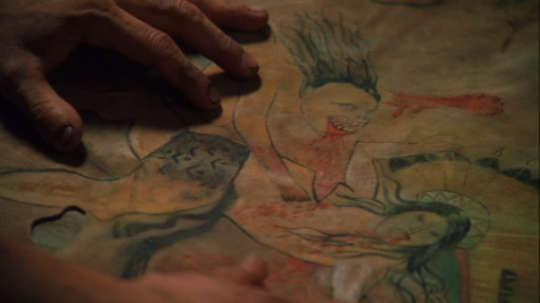
Other than the aforementioned TEXAS CHAIN SAW, RAVENOUS was the first movie I had ever seen that addressed the neurological reality of trauma. Boyd's uncontrollable vomiting at the very beginning of the film is just a taste of Antonia Bird's mastery of this subject. She has ample opportunity to address this with her cast when the interloping cannibal "survivor" Colqhoun, first leads the unsuspecting Fort Spencer crew to the cave where he says the "real" cannibal is hiding out. Upon their arrival, Colqhoun throws himself into an alarming fugue state, apparently reliving the trauma of the nightmare from which he fled. He pants and gasps, smirks and grimaces, claws at the air and at the earth, as if to bury himself, effectively scaring the shit out of everybody. After he reveals his true intentions and massacres most of the crew before chasing Boyd and Reich off the edge of a cliff, another interesting neurological event transpires. At the bottom of the hole into which they have plummeted, with Reich's last spasm of life, he clamps his fingers around Boyd's throat until his maniacal laughter turns into a death rattle. An even finer example comes after Boyd has returned to camp, having shamefully mended his wounds by dining on Reich's corpse as per the wendigo myth. Still recuperating, Boyd greets the arriving officers who are escorting the Fort's replacement commander--who turns out to be Colqhoun, now dressed neatly as the "Colonel Ives" on whom he blamed the cannibalistic murders of his fellow frontiersman. At the sight of this shocking enemy, Boyd pivots wildly and slams face first into the nearest wall, crumbling like a swatted insect on the floor and shaking uncontrollably.
These are some of the principle moments that won RAVENOUS my heart, and that really let me know what I was searching for in films. In fact, this movie was so formative for me that it led to a sort of impromptu ritual of breaking with my childhood. As with all cultists, my desperation to rope in everybody I knew intensified along with my obsession. I couldn't imagine that anybody would reject this beautiful and fabulously unusual work of art. I pulled a lot of wins, but I was in for a rude awakening where it should have counted. I refer to my "best friend" and "high school sweetheart" of about ten years, a guy who dominated my cultural life for almost as long as we were pals, since he was slightly smarter and had slightly better taste than our high school peers, but very little interest in having his mind expanded, as I eventually realized. When I showed him my new favorite movie of all time, I was brutally disappointed by his scoffing at every scene that I considered to be the movie's crowning accomplishments. He scrunched up his face and rejected Reich's murderous dying breath as "stupid" and "fucked up" and "making no sense". Today I'm not sure how hard I tried to explain that, look, we're talking about a character who is on the brink of death, whose final moments were in especially ugly combat, and who is really extremely brain damaged; more to the point, he really hates Boyd, the coward, and may have tried to kill him at some point even if he were fully possessed of his faculties. I mean, we're finally seeing something psychiatrically real here...aren't we? I got the same snotty dismissal from my viewing companion when Boyd went into shock at the sight of Ives--shock, a real acknowledged medical condition--and really during any scene that he considered too awkward and bizarre to be "cool" and heroic. It was at that very moment that I knew we wouldn't be friends for much longer, and we actually fell out of touch a few years later.
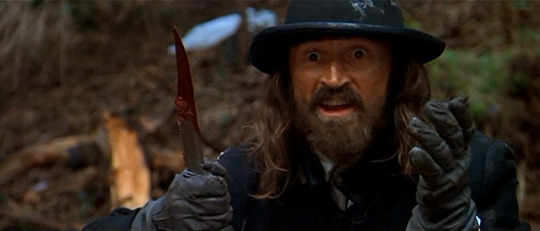
With that personal digression out of the way, though, I'd like to return to the cave (don't I always?) to discuss how Antonia Bird, her DP Anthony B. Richmond, and her editorial team work together to keep the audience in more or less the same state of discomfort and disorientation as the characters. RAVENOUS was also the first movie that taught me how to interpret the visual grammar of film, since I watched it so often that, eventually, I couldn't miss what was going on. Bird and co. have a way of distorting and compressing space that prevents the viewer from ever really knowing where you are. When the crew arrives at the low, carbon black mouth of the cave, there is a sense that it couldn't possibly be as deep as Colqhoun's story suggests (and in practical reality, it isn't). When Boyd and Reich creep inside, the tunnel plunges promptly into a weird homey sublevel where Colqhoun had been subsisting on his fellow travelers. This is sort of weird, but not as weird as what happens outside. When Colqhoun plunges into his fugue state, we see in it a sweaty, spittle-flecked closeup. His behavior spooks Toffler, who in his own closeup cowers against his commanding officer Colonel Hart (Jeffrey Jones, playing essentially the same character as in Deadwood). Colqhoun appears to stalk closer and closer to the camera, but how close is he to Toffler and Hart? We have no idea, until he circles back to the pit he just dug and then lunges through the air to plant a knife in Hart's abdomen, gutting him. Then, when Boyd and Reich give chase, there is a moment where Reich stares into the camera, giving Boyd an order. Boyd looks shyly into the camera before glancing off, suggesting that he flinches away from Reich's hateful gaze--but in the next shot, we see that Boyd is actually behind Reich, looking in a completely different direction. Part of me suspects that Bird and her crew were making the most of the small and somewhat sparse-looking patch of woods that they had for this scene, but it gets more interesting later on. As Colquhoun-now-Ives surreptitiously prepares a human stew back at camp, the permanently drunk Major Knox (Stephen Spinella, who seems determined to turn RAVENOUS into a balls-out comedy) shouts down the hysterical Boyd--all in closeup, so where are they? As it turns out, Ives is in one building, Knox stands in a passageway outside the door, and Boyd sits shackled in a separate building in the distant background. Finally, in Boyd's epic showdown with Ives, there is a fascinating moment in which Boyd saunters into the room, gazing staunchly ahead, ready to kill. Cut to Ives standing in front of a roaring fire, spinning neatly to face his adversary--but when we cut back to Boyd, we see that he is completely alone in the space. Shortly, Ives plunges through the ceiling behind him; they were never even on the same floor. RAVENOUS consistently leaves the viewer as disoriented and untethered as its characters are emotionally.
This battle itself harkens back to the movie's crucial focus on the often degrading and humiliating experience of piloting a human body. In both the James Bond and slasher movie models of movie behavior that I previously discussed, a climactic showdown should be fast-paced, furious, with impressive feats of athleticism by the combatants. Not so in RAVENOUS. The final scene is accompanied by an eight-and-a-half minute minimalist trudge through hell by Nyman and Albarn that never threatens to raise your blood pressure with stings or arias. The music perfectly matches this sluggish fight between two men whose bodies have been repeatedly destroyed and recreated. Their weapons are a letter opener, a meat cleaver, a pretty substantial log, and finally, a massive bear trap. The conflict is no clash of the titans, no beautiful realization of the full potential of male aggression. It is gruesome, tragic, and in some way, romantic.

I would be remiss if I failed to dig in to the eroticism of this movie. Like all vampire movies, there is a virgin and a seducer, a victim who calls their lack of worldliness dignity, and a predator who sees chastity as a shameful waste of life. RAVENOUS is one of at least three movies that Antonia Bird made about the unique relationships between men in traditionally male situations. Her heist movie FACE has been compared to HEAT, though I am really thinking of the incendiary drama PRIEST. In this, her impressive directorial debut, a young man of the cloth struggles with the disturbing intrusion of sex into his chaste life, be it in the lives of deviant clergyman, or abused child parishioners, or in his own struggle with homosexuality. Robert Carlyle plays the unhappy lover left out in the cold, drifting down the street on a skateboard like a hovering ghost, trying to convince the eponymous character that love is greater than its stingy biblical proscription. While there are no literal love scenes in RAVENOUS, it takes place in a similar world, made up almost only of men--men who are brothers in arms, who look after each other's souls and bodies, and who even consume each other's bodies, who gain strength from one another by breaking the ultimate taboo. The closing image, of Boyd and Ives pinned chest to chest by the bear trap, bleeding to death in each other's arms, remains for me one of the tenderest images in all of horror cinema.

I would like to close by asserting that Bird's deft exploration of male sensitivity is nowhere more powerful than in her direction of David Arquette, the unlikely shining star of RAVENOUS. The often intolerably wacky comedic actor plays Private Cleaves, an absolute reject from society who (barely) functions as the help around Fort Spencer. He and George (Joseph Runningfox), one of two Native American appendages to the crew, are consistently high out of their minds, which may make them look like fools, but it also designates them as being the most wisely in touch with the genuinely hopelessness of their situation. When George is slaughtered by Colqhoun, Cleaves is left all alone tending the Fort, and he has a few scenes of powerful vulnerability before his inevitable demise. In between two key plot beats, we find Cleaves and George's sister Martha (the quietly wonderful Sheila Tousey) standing together in the snowy yard, observing the new commanding officer's arrival. What should be a forgettably dry piece of exposition concludes with Cleaves instinctively turning to Martha and stroking her hair, which causes both of them to dissolve in tears. In an adjacent scene, Boyd watches through the window as the agonizingly bereaved Cleaves chops wood in the yard, alone. Cleaves, certainly intoxicated, weaves and sweats, giggling in an unnervingly forced manner to try to resurrect the perpetual good time that he once enjoyed with his murdered best friend. The scene dissolves into a fantasy in which Boyd gives in to his mounting cannibalistic urges and eviscerates Cleaves--throughout which Cleaves laughs and laughs with escalating insanity. It is difficult to convey the raw force of the sequence in words, so I will just say this: Early this year, I dared to point out that among the many strange virtues of STARSHIP TROOPERS is the fact that terminal screwball Jake Busey is so warm, so funny, and so emotionally available in that movie that it almost throws off the deliberately boneheaded artificiality of the entire rest of the cast. So, I would just like to conclude that, if your movie involves somebody from EIGHT LEGGED FREAKS or Shasta McNasty, and you get that person to provide you with one of the most sensitive performances in the whole show, you're probably doing something right.
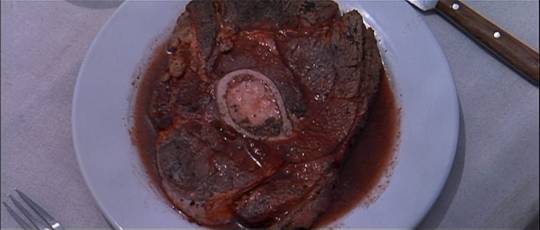
#blogtober#horror#cannibal#cannibalism#wendigo#vampire#antonia bird#robert carlyle#guy pearce#david arquette#stephen spinella#neal mcdonough#john spencer#ted griffin#jeffrey jones#jeremy davies#ravenous
75 notes
·
View notes
Text
GOT Recap: A Knight of the Seven Kingdoms
Airdate: 4/21/19 ; Season 8, Episode 2
Meep, things are really heating up on Game of Thrones! Or rather, cooling down…oh heck, I don’t know what to do with all the Fire and Ice metaphors. Let’s just say, stuff is getting real and the latest installment of GOT gave us one last moment to enjoy the fuzzy warm feels before next week’s huge battle against the Night King’s army begins. This last episode was all about wish fulfillment and tying up loose ends for viewers – and I’m still a bit conflicted about how I feel about it all. But fear not, we’ll get into my two cents about it very soon. Now, find a warm body to snuggle up to and get a toasty fire going, because the night is dark and full of manipulative story ploys. Here’s my recap of: “A Knight of the Seven Kingdoms.”
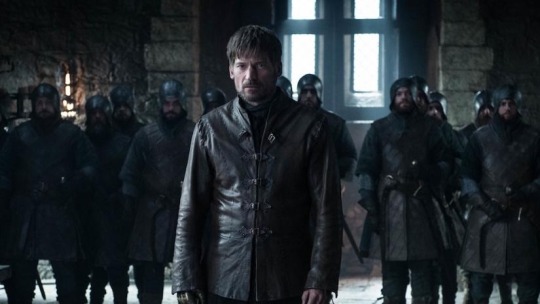
I Know What You Did Last Long Summer
We start things off with Jaime Lannister standing before a tribunal in the Great Hall at Winterfell, with Sansa Stark, Daenerys Targaryen, and Jon Snow seated at the VIP table. Dany shares that she and her brother grew up talking about what they would do to the man who murdered their father, once they captured him and reclaimed the Seven Kingdoms. She points out that Cersei promised her an army, and instead has only sent one man with one hand. Ouch, that smarts. Jaime fills everybody in on Cersei’s plan: She isn’t sending any help. Rather, Queen Cersei has procured a hired army and is sending them to Winterfell to finish off whatever survivors are left after the impending war against the Dead. She lied to them all – Jaime included – and he left her to come and join Jon and Dany’s battle for the living. Daenerys casts a pointed gaze at Tyrion Lannister, who looks miserable. Ya done messed up, Ty!
Dany wonders how they can possibly trust Jaime. Tyrion sticks up for his brother, but is shot down by Daenerys who counters that perhaps this is an elaborate scheme for Jaime to assassinate her. Sansa chimes in that Jamie can’t be trusted, and lists the crappy things he did to House Stark, including attacking Ned Stark back in Season 1. When Jaime defends his actions saying it was during a time of war, and that he was protecting his family, Bran dryly states “The things we do for love.” Fear flickers in Jaime’s eyes. Bran knows!
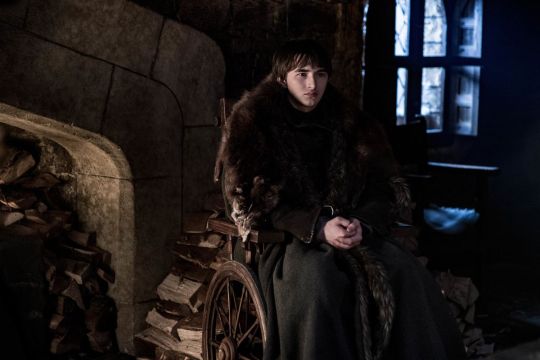
Brienne of Tarth steps up and defends Jaime. She tells Dany how she and Jaime were captured a few years back and he defended her when she was this close to getting raped – and lost his hand in the process. To Sansa, she says that it’s only due to Jaime’s honor in keeping his word to Catelyn Stark that Brienne was able to find and save Sansa from the sadistic Ramsay Bolton. This is enough to change Sansa’s mind. Dany seems peeved by Sansa’s about-face and asks Jon what he thinks. Visibly still grappling with the bombshell about his parents, Jon doesn’t even look at Dany and simply states they need all the extra help they can get. Dany allows Jaime to stay and fight with them, and they all rise. Sansa huffs off and when Dany turns to Jon, he’s all “K gotta run, byeeee.” Ugh, you let a guy ride your dragon one time and then he gets all weird on you. Brienne shoots Jaime a look that clearly states “Don’t make me regret sticking my neck out for you,” and Bran just stares at him. Again. Creepily.
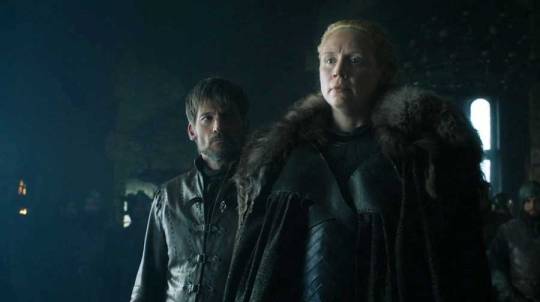
Rebuffed by her lover, and fuming about Cersei’s deceipt, Dany is ripe to start throwing cell phones at her assistants. She chews out Tyrion for being either in cahoots with Cersei, or a damn fool. When Tyrion tells her it’s the latter, she retorts “It’s not the first time,” and indicates his time may be up serving as Hand of the Queen. Varys and Ser Jorah are all “Awwwwkward.”
Number 1 Crush
At the Winterfell forge, we see Gendry’s handiwork: Tons and tons of spearheads and other weapons made of dragonglass are ready to be wielded. As Gendry works, Arya approaches and takes in all his hunky, sweaty manliness, then asks him about the weapon she requested. “Yeah, I’ll get right on that after I make a few thousand more of these. Shouldn’t you be hanging out in the crypts anyway when the fighting begins? It’s the safest place to be.” Arya questions why he thinks he’s qualified to fight – he’s just a blacksmith. When he tells her he killed a few of the Dead and she wants to know what they’re like, his reply is “Really bad”. “How bad are we talking, dude? What do they look like? How do they smell? When they change a toilet paper roll, do they do it the wrong way or the right way – and don’t you DARE say there isn’t a right way, Gendry!!” “Ok, fine, they’re like death, ok?” “Oh, cool, I know all about death!” Arya gives Gendry an impressive demo of her razor sharp knife throwing skills – it’s instant bonerville for Gendry. “So…how about that weapon?” – “Yes, ma’am, coming right up!!” Ok, these two flirting is just too much. Arya is such a badass, I love it! And she deserves a little joy in her life.
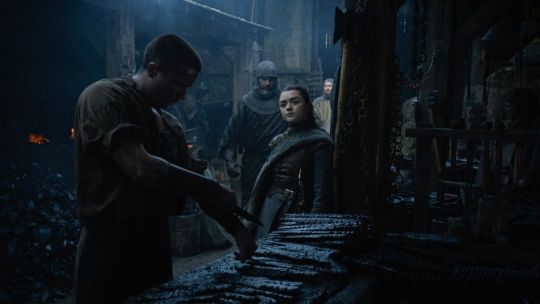
Meanwhile, a very remorseful Jaime seeks out Bran by the Weirwood tree and apologizes for pushing him out the tower window all those years ago, rendering him a paraplegic. Jaime questions why Bran didn’t tell the others about this, and Bran tells him he can’t be much use in their fight if Bran lets his family murder Jaime. “But aren’t you mad at me?” Let’s just break this down for you, dude: Bran ain’t mad at anybody. He is so beyond all those petty human emotions, because OMG you guys are all about to be annihilated by ruthless ice zombies and Bran is trying to figure out how to stop it. “Ok, so what happens after?” asks Jaime. Bran counters, “What makes you think there is an after?”
Oooh sidebar! Y’all I have been knee deep in GOT theories the past few weeks, and one of the theories I’m really into says that Jaime might be Azor Ahai (the Prince who was Promised) and plays a huge role in defeating the Night King. There’s this whole prophecy about it in the books, and the High Valyerian words for “Gold” and “Hand” are very similar to the words “Lord” and “Light”. After this chat with Bran, I’m convinced Jaime is a key player in ending the Night King’s reign.
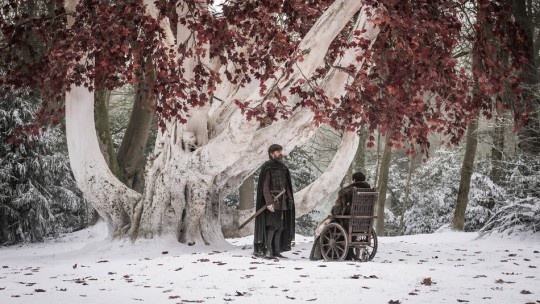
Later, Tyrion and Jaime walk around the courtyard, discussing the two queens. Tyrion says how he truly believes Daenerys will be a great queen for the realm, and the two commiserate over how Cersei fooled them – the part about being pregnant is true, though. Tyrion notes that Jaime has never been fooled by Cersei, he’s always loved her in spite of her miserable character. When Tyrion remarks that they are likely going to die at Winterfell, he muses that at least Cersei won’t have the satisfaction of killing him. Hey, maybe his dead corpse will go down to King’s Landing and tear her apart - but Jaime isn’t listening. He is distracted by something else – or rather someone:
Brienne of Tarth, is on the practice field, watching Podrick as he spars with another fighter. Jaime shows up and chats with her about the impending battle. Brienne is weirded out by how nice Jaime is acting, because he’s always shown his snarky side around her in the past. He tells her he returned to Winterfell because we wants to serve under her command. She excuses herself. Oh man! Brienne has been holding a torch for Jaime for so many seasons and he is finally sorta living up to the person she has seen in him all along: a good and honorable guy. And he came to Winterfell to fight alongside her? Hubba hubba. And yet…I don’t see anything romantic ever happening between these two, even though there is something there. It just feels like he’s the super popular dude who’s had a lot of personal growth and really likes her and cares for her, but will never actually date her because she isn’t a supermodel. Ya know what I mean? Brienne is in the friend zone 4eva. Also, I think this whole exchange means Brienne ain’t long for this world – she’s probably going to sacrifice herself to save Jaime during the battle. Sorry, Bri Bri! We love you, though!
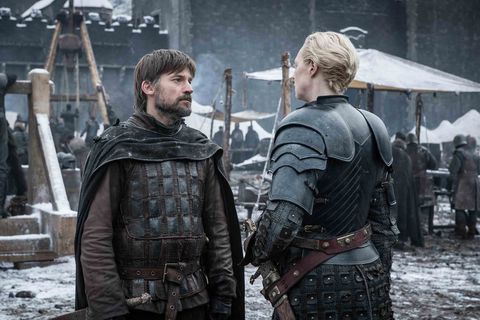
A Matter of Trust
In Daenerys’s quarters, Ser Jorah takes a moment to tell her to take it easy on Tyrion. He knows his Khaleesi is super pissed, but he advises her to see past Tyrion’s flub and keep him on as Hand of the Queen because he has a super big brain. Coming from Jorah, this means a lot. Then he offers another suggestion: Make more of an effort with Sansa Stark.
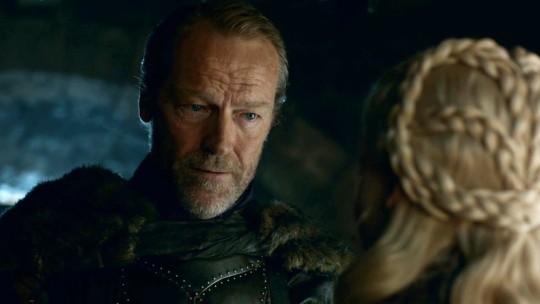
In the great hall, Dany requests a heart to heart with Sansa Stark who also puts in a good word for Tyrion when Daenerys makes a snarky remark about not having faith in her advisors. Geez Louise, everybody is sticking up for Tyrion in this episode! The conversation turns to Dany drawing comparisons between herself and Sansa as female leaders in a man’s world and then she’s all “Girls rule, yay!!! So...why don’t you like me?” - “Honestly? Because guys can do pretty dumb stuff for women and they’re easily manipulated. And you basically convinced Jon to give up his crown for you” Dany’s all: “Ok, so, real talk? I was all about taking the Iron Throne, and then Jon pops up and tells me about these weird Snow Zombies coming to destroy us all, and I dropped everything to help him fight his war, so…who is being manipulated?” [Personally, I think that’s a lame argument, because obviously the survival of mankind is still totally in your interest, Daenerys, because if they are all dead you don’t have anybody to rule, m’kay?] Sansa warms a bit to Dany, and tells her she should have thanked her when she arrived. But just as Daenerys is cozying up to Sansa and holding her hands, Sansa takes things right back to business – God, I love her for it: “So, Dany, riddle me this: Let’s say we defeat the Night King and Cersei. What happens next?” Dany’s face is a little perplexed “Um, I rule on the Iron Throne. Obviously.” –“Yeah, but what about the North? We took back our land and we swore we’d never give it back, so…what about the North?” This does not make Dany happy, and she looks about ready to lose it.
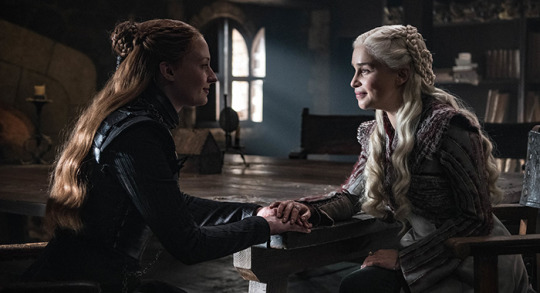
Thankfully, however, their conversation is interrupted by the arrival of: Theon Greyjoy and his men. He fills them in on the successful rescue of Yara, and informs Queen Daenerys that Yara is reclaiming the Iron Isles for Dany. He returned to fight for Winterfell – if they’ll have him. Sansa’s eyes fill with tears and she rushes to embrace Theon. It’s a very sweet moment but also, I’m immediately worried that the writers are going to try and make something romantic happen here. Ew, not Theon. I’m just going to chalk this up to him and Sansa sharing a strong mutual survivor bond. Also, my death prediction: Theon is sooo gonna die. And they've been making Daenerys super unlikeable these past two episodes that it has me a little nervous they might off her, too.
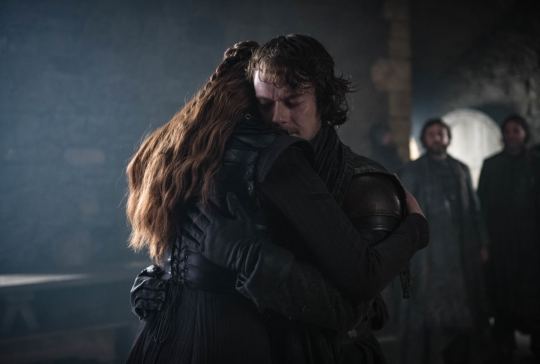
In the courtyard, Davos is running a soup kitchen and gives a short pep talk to some of the men who have arrived. Gilly is telling some girls how safe the crypts are – the safest place at Winterfell, actually. You guys, make sure you write this down: The crypts - where they keep all the dead bodies which have not been burned - are the safest place in Winterfell. So if you have zero fighting skills, you really totally without a doubt need to head to the crypts where no dead bodies will suddenly come to life and attack you because the crypts are S-A-F-E, you got it?
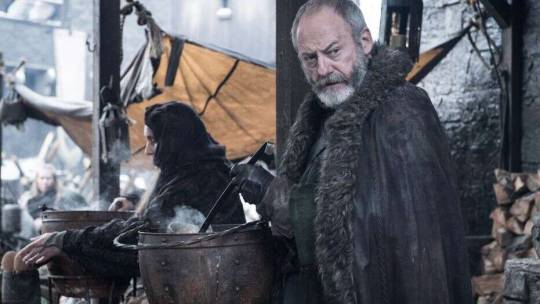
A little girl asks where she should go when the battle starts because she wants to fight, too. Gilly advises her to go to…you got it. The crypts. Le sigh.
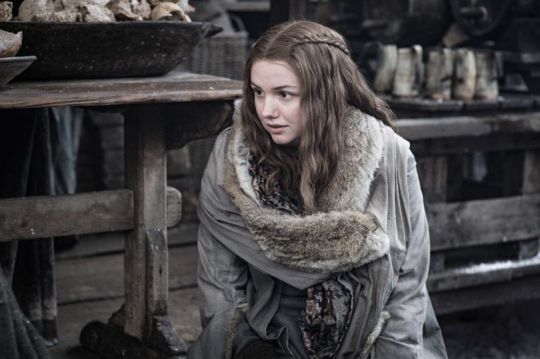
A horn blows and Jon turns the corner to see who it is: The Night’s Watch from Castle Black have arrived and as he goes to bro hug Dolorous Edd, he’s tackled by Thormund Giantsbane like an overjoyed Saint Bernard pup. Beric Dondarrion is there, too. Yay, Jon’s happy to see them all and probably is even happier that he has more legit reasons to avoid Daenerys. His friends inform him they met up at the Last Hearth - everybody was dead and gone. It’s safe to assume anybody who hasn’t made it to Winterfell by now has been claimed by the Night King’s army. Jon asks how long until the Dead will arrive and Thormund replies: Just before sunrise. Also, Thormund would really like to know where Brienne is. Oh me, oh my – will my Brienne, Jaime, Thormund troika dreams come true? Unlikely, but I do love Thormund’s interest in Brienne, if only for the comic relief it provides.
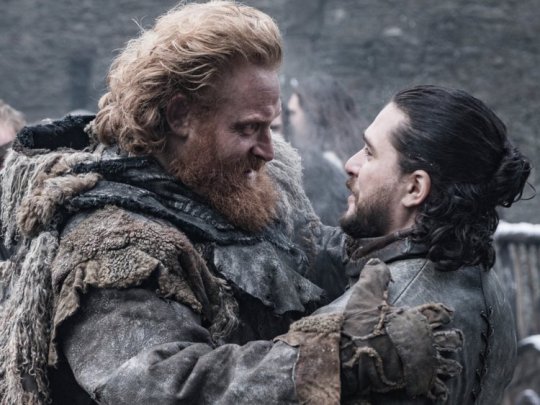
In the war room, all the important peeps have gathered to talk strategy. The Night King’s army is too big, and they never tire, so Jon & Co. won’t be able to beat them in a straight fight. Their best chance at survival is to kill the Night King – if they kill him, they kill his army. But how? If he’s that important, the Night King won’t risk exposing himself – when they say this, I just imagine the Night King in a long trench coat. Yeah, I’m mature. Bran volunteers to be human bait, because the Night King is after him. But why, Bran, why? We discover that the Night King’s ultimate goal is an endless night and he wants to wipe out all trace of men and their memories. Bran is basically a human hard drive with the entire history of their world and the Night King wants to erase it all. I don’t know…it’s kind of a weird reason to me. I mean, if the Night King is gonna kill everybody anyway, why is it so important that he kill Bran first? Sam waxes poetic about death and how when we die our memories are forgotten and we are forgotten, blah, blah, blah, but I still don’t get it. What is the difference between wiping out all of mankind’s history and killing everybody vs. just wiping out mankind? Wouldn’t wiping out mankind just, like...wipe out mankind and its history? I don’t know folks. Clue me in if you understand. Or is it just a matter of getting rid of any evidence on how to stop the Night King? In that case, just say so, Bran.
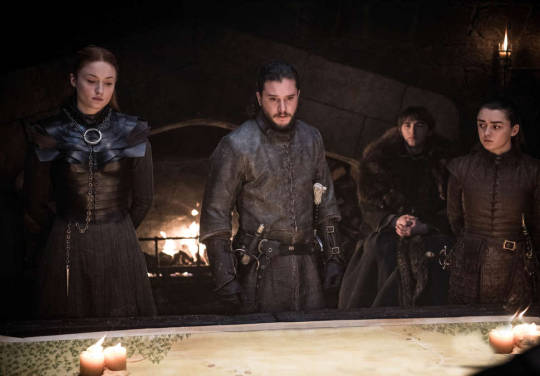
Anyhoo, Bran will wait for the Night King in the Godswood – he has a GPS tracking device on him, so the Night King always knows where he is. His siblings are vehemently against it, but Theon volunteers to be there with his guys to help protect Bran. Why do we think this is a better idea than Bran’s own family protecting him? I mean, other than simply using this as a plot device for Theon to die while defending Bran and thus somehow redeem himself for all the shitty stuff he did to the Stark kids when they were younger? Obviously, I’m not a big fan of this scene.
Dany tells Tyrion he’ll have to wait in the crypts during the battle because: a) they are super safe and b) Dany needs his mind because her faith in him has been restored. Yeah, after hearing what everybody told her so far, she also polled 28 whores about his character and realized she shouldn’t fire him after all because he’s a good dude and actually really smart. Except for when it comes to trusting his evil sister, whose superpower is stabbing people in the back, who has always hated him, and has never done anything in her life to prove herself trustworthy in his eyes.
Oh, and one more thing: They’ll need to have the dragons close by to save Bran if things go bad. Not too close to give anything away. Just close enough to probably be completely useless and get one more dragon killed. M’kay? Sounds like a plan, team!
As they wrap things up, Thormund points out the silver lining: They are all going to die, but at least they’ll die together. He flashes a winning look at Brienne. Jon hastily leaves, expertly avoiding Dany once again, and everybody except Bran and Tyrion exits the room. Tyrion tells Bran he wants to hear all about his stories and they both settle in next to the fire.
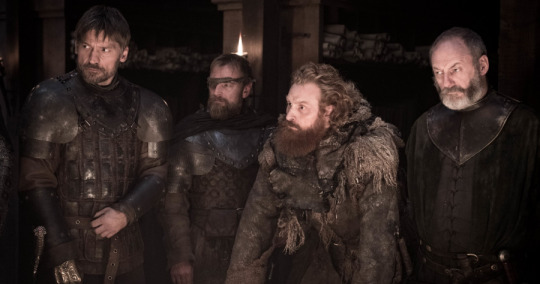
One Last Waltz
And now…get ready for the showrunners to check off all your hopes and dreams for all your favorite characters so you can have one final lovely memory of them all alive before everything goes to hell:
In the courtyard, Grew Worm and Missandei share a special moment where they make plans for the future. Once Grey Worm has finished securing the throne for Daenerys, he’s gonna retire with Missandei and she can visit her home again. And he’ll keep her and her peeps safe with his Unsullied pals as they live happily ever after. So…he’s gonna die, right?
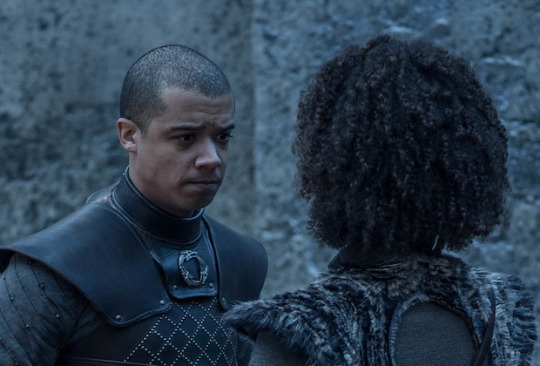
On the ramparts, Jon and Sam hang together with Ghost nearby. Yay, finally we see a direwolf again! Sam asks Jon when he is going to fill Daenerys in on the revelation of Jon’s true parents. Edd arrives and declares “And now our watch begins.” Gilly and little Sam will be in the crypts (wanna know why?) and Jon tells Sam he can go, too – to protect them – but Sam scoffs and asks his buds to give him some credit. He was, after all the first of them to kill a white walker and discover other ways to defeat the Dead. They take a moment to remember their fallen friends from the Night’s Watch and Edd grimly states “Last man left, burn the rest of us.”
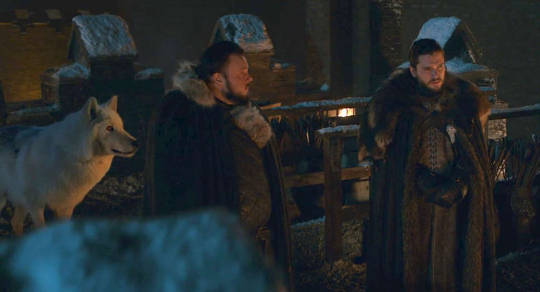
In the Great Hall, Tyrion and Jaime sit by the fire and enjoy a cup of wine as they ponder how much they’ve changed since their last visit to Winterfell and Tyrion bemoans the perils of self betterment – gone are his days of excessive drinking and whoreing.
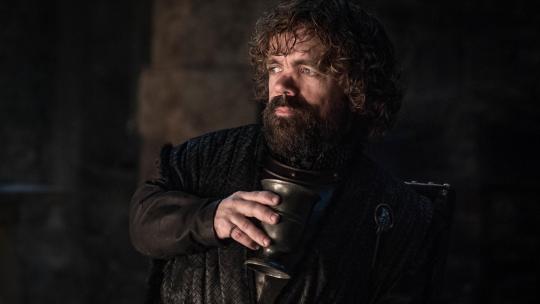
Brienne and Podrick arrive in the great hall – oh hai, guys! They were looking for a place to warm up, and Jaime insists that they join him and his bro. Brienne agrees – obviously. Is she going to pass up the chance to be with her hunky unrequited love? Never. Oh, and would you look at that! Davos and Thormund pop in as well to join some theater in the round. Thormund regales them with a hilarious story of how he got the “Giantsbane” moniker. Truly, he is the shining star in this episode and certainly in this scene. I’m feeling extra manipulated by the show – now that we’re more emotionally invested in him, I’m 100% sure that he’ll be killed off next week.

Up on the ramparts, Arya sees the Hound and sits next to him. They have a nice moment when she questions why he’s even here fighting with everybody. “When is the last time you fought for anybody?”, she asks. He replies gruffly, “I fought for you, didn’t I?” And that is the line that wins the night. Awwwww, I love the Hound. Then Beric Dondarrion shows up and ruins the moment. He apologizes to Arya for the way they parted the last time they saw each other – ya know, when he sold out Gendry to Melisandre to do her voodoo magic. When he starts talking about the Lord of Light, the Hound tells him to shut his trap and Arya is all “Peace out, I’m gonna find something better to do than spend my final hours with you old farts.”
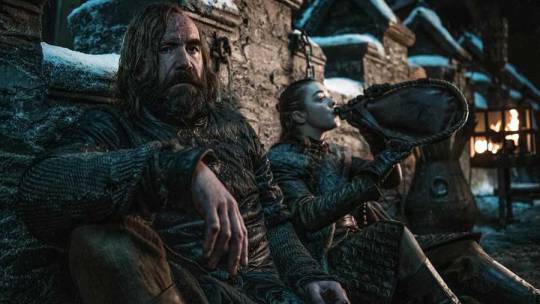
Next, Arya whiles away the time with some archery practice when Gendry arrives with the weapon he’s fashioned for her. It’s a spear and she gives it a whirl – not bad at all. As she shows off her fancy spear twirling skills, Arya asks Gendry what Melisandre did to him after she took him, and he tells her about the blood magic. She assumes (correctly) that Melisandre had sex with Gendry and suddenly Arya is grilling Gendry about all his past partners, presumably calculating her risk of contracting syphilis. Apparently, Gendry’s number of former lovers is satisfactory and Arya reveals that if she’s going to die in the battle against the dead, she wants to at least know what sex feels like and they get. It. On. Oh my stars!! I’m equal parts stoked that Arya and Gendry hooked up, and also intensely worried now that one of them will die – maybe even both of them. Gah! I wish I wasn’t so traumatized by GOT to assume that any time a good moment happens, it will be yanked away, but such is the life of the Game of Thrones fan: We can’t have nice things.
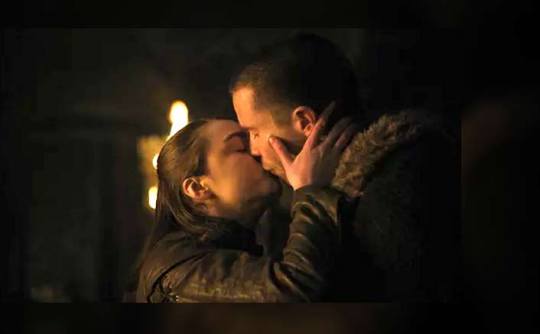
Call Me By Your Name
Back in the Great Hall, Tyrion remarks how all of the people in the room had at one point fought the Starks in one way or another, and now they are united in fighting together at Winterfell. As Tyrion gives them all a verbal pat on the back for surviving so many battles, he accidentally calls Brienne “Ser” and corrects himself. Thormund is confused that Brienne isn’t a knight, and she tells him women can’t be knights because sexist traditions are alive and well in Westeros. When Thormund tells her he’d make her a knight if he were king, Jaime points out that you don’t need a king to be knighted – another knight can do it. And so, with a little coaxing everybody encourages Brienne to get knighted. She’s always wanted to be a knight and she accepts the honor with all the grace and reverence it warrants. Ser Jaime Lannister taps her shoulders with his sword, reciting the words and at last proclaims her a Knight of the Seven Kingdoms. As the men in the room start a slow clap and cheer for her, Ser Brienne of Tarth rises with tears in her eyes and a luminous smile. Oh God, she’s toast now!!!!
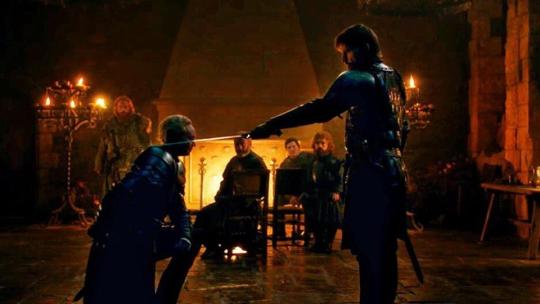
In the courtyard, Ser Jorah Mormont and his little cuz Lyanna Mormont argue. He thinks she should go to the crypts –I really don’t want to say this, but I must…because they are the safest place to be—and Lyanna insists that she vowed to fight, and that’s precisely what she’ll do. She wishes him well just as Samwell Tarly shows up. He presents his family’s sword to Ser Jorah. It’s called Heartsbane and it’s made of Valyrian steel. The sword is too heavy for Sam to wield himself. He shares that Lord Commander Mormont – Jorah’s father – was a wonderful mentor who taught Sam to always do what’s right, and Sam would be honored for Jorah to have it. Ser Jorah accepts the weapon, and then Sam has to go and say something like: “I’ll see you when the battle’s through.” F#$K!!!! So now Jorah’s gonna die?! I can’t take it, you guys!
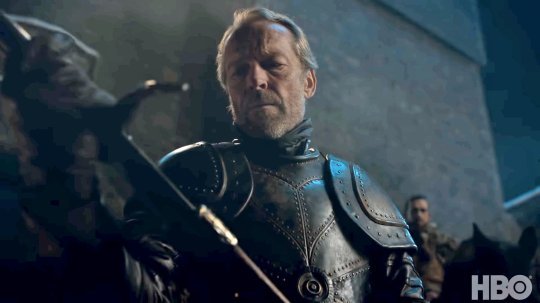
Aaaand we’re back at the Great Hall, where the wine has run out and the karaoke portion of the night has begun. Podrick, it turns out, has the voice of an angel and treats the group to a lovely and haunting melody. It’s a perfect tune for a montage scene and we get one last glimpse of all the characters we’ve come to love as they have one last tender and bittersweet moment of togetherness.

In the ever-so-safe crypts, Jon stands at Lyanna’s coffin and statue, and Daenerys approaches. She asks who the statue is of, and Jon simply says “Lyanna Stark.” Dany knows the story of Lyanna’s abduction – she tells Jon that she grew up hearing such good things about her brother Rhaegar, who was known to be kind and decent, and yet, he raped Lyanna. Jon corrects her “Oh, but he didn’t,” and all the details spill out. Dany is shook by the revelation that Jon is actually Rhaegar’s legitimate son and asks how he knows this – she is not impressed by Jon’s sources and points out how convenient it is that his brother and best friend are the only people who can corroborate the story. Her thoughts immediately go to the Iron Throne and the fact that Jon would have a better claim to it, if what he says is true. Before they can go into things further, a horn sounds: The Dead are here. Jon and Dany give each other a look of agreement and both storm off – presumably to ride some dragons.

In the dark, a horse’s hoof stops in the snow and as the camera pans up, it reveals the Night King’s lieutenants all lined up in formation, ready for the attack, their gaze fixed upon Winterfell in the near distance. Roll credits.
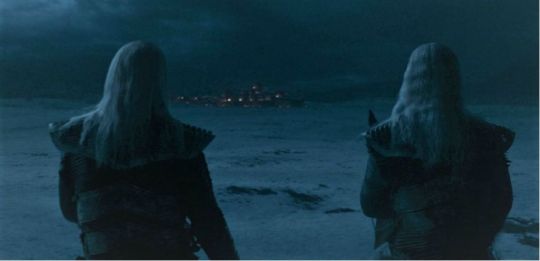
Holy moly so many people are gonna die next week, and I am losing my mind over here! This episode was a lot of things, and while I feel like I got all the moments I technically wanted, I also feel weirdly placated by the writers for actually giving those moments to us viewers. I’m not sure how true some of the actions were to the characters, and it seemed more like the last 20 minutes were purely catering to the audience’s wishes before the showrunners kill off all the people they shone a spotlight on in this episode. It’s hard to truly enjoy something when you feel like you’re being set up for a fall, ya know? But overall, it was a fine episode to set up the epic battle next week.
The takeaways for me were: Jaime has an important role to play in ending the long night. Dany’s whole worldview is going to have to be reconsidered unless of course she (or Jon) dies, making the whole “Who deserves the crown more?” a moot point. Maybe she’ll even screw Jon over? Tyrion will likely survive and I’m wondering if Bran shared something important with him during their chat. That way, if Bran should perish, Tyrion will have some trump card of knowledge to share with the others. Arya is probably toast – if not, then Gendry is. Brienne will die – for SURE! Oh, and the crypts are the least safe place to be and some freaky deaky stuff is gonna happen down there next episode.
I would like to point out that we didn’t actually see the Night King standing outside Winterfell with his homies. Like I mentioned earlier, I am reading so many different theories and one is that the Night King is splitting up his army, and he is heading straight to King’s Landing with his ice dragon to torch the city and turn its 1 million inhabitants into an army that nobody can match.
Will all my death predictions come true? Will the Night King fool us all and fly to Essos to kill the fire priestesses? Or will Melisandre suddenly pop up at the 11th hour to save the day? Are there any other important theories I have yet to discover? I’m sure by next week we’ll know a lot more, and also be bawling our eyes out as Jaime tenderly holds a dying Brienne in his arms, who it turn holds a dying Thormund in hers. It could happen, you guys. I’ll see ya here next week for a grief group therapy session!
#GOT#Game Of Thrones#GameOfThrones#Seven Kingdoms#Brienne#Lannister#Stark#Targaryen#Season 8#a knight of the seven kingdoms#Daenerys#Sansa#tyrion#jaime#recap#recaps#GOTrecaps
6 notes
·
View notes
Text
Ranking : Top Films of 2018
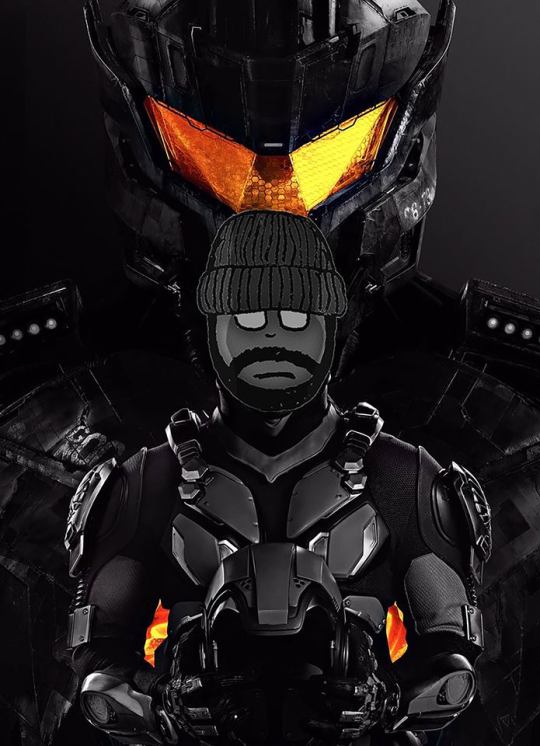
Here we are... that moment that every critic simultaneously loves and dreads : the Year-End Top 10 List. At worst, we are forced to scrape the creative dredges and cobble together something that resembles a best of list that will bring glory and honor to the year. At best (like this year), we are forced to leave personal favorites in the dust and judge the larger quantity of offerings on a much tougher scale in order to truly represent the top quality work of the year.
As I’ve said in many pieces this year, 2018 was a joy in terms of being a film-lover. This list was not an easy undertaking, and it more so resembles a snapshot of how I’ve felt over a judging period than it does a concrete group of selections in a fixed order. Take this list as more of a jumping off point for discovery than you do the gospel of DOOMonFILM.
Note : I am not sure when I will get a chance to see Vice or The Favourite, which I am sure will skew my results once I do see them... I will address those films in their respective reviews, however. Forgive me in advance.
Honorable Mentions
Damsel
Even if the Zellner Brothers weren’t representing Austin beautifully with this gem of a film, it’d still be on my radar simply for the fact that it is a unique twist on a genre that most figured had seen every presentation imaginable. Add to that a strong female lead character, and you’ve got a winner on your hands.
The Endless
A science-fiction modern day classic, and apparently part of a possibly bigger line of stories (with some of the best integration of aspects from another film I’ve ever seen). This film is chilling in its approach to the concept of cults, as well as its use of the concept of ‘the danger that lurks just off-screen’.
Isle of Dogs
Had this year not been full of stellar animated films, this one probably would have made the main list. More groundbreaking animated films, combined with personal feelings about the films of Wes Anderson, however, regulated this one to Honorable Mention status.
Mid90s
I was all set for Eighth Grade to be my bit of nostalgia, or my reflection on what it’s like to be a kid again, and for what it’s worth, it was a great film. The thing is, Mid90s directly spoke to me in a way that Eighth Grade unfortunately could not, simply because Mid90s was like looking in a time-traveling mirror.
Thoroughbreds
I really wanted this to be on my top 10, but ultimately, it was too ‘quiet’ of a film to make it in a year full of big noise. Thoroughbreds will certainly be a future favorite for public screenings and friend viewings, but a couple of films this year hit the same notes on a higher frequency.
Black Panther
The cultural impact of this film is one that cannot be ignored. It took February, a month that is generally a box office bust, and it put up unparalleled numbers that not only lasted throughout the year, but were topped from within rather than by another Hollywood studio. The respect given to the characters and their African heritage did not go unnoticed, either, as several think-pieces and a number of curriculum were spawned from those researching elements of the production design. The narrative is strong, and it righted the Marvel villain boat prior to the big MCU bombshell that was lying in wait.
The Favourite
I really wanted this to make the top 10 of the year... I thought long and hard about what film I should remove or replace. What I came to realize, however, is that despite The Favourite being a world-class comedy and production, it simply falls short in the realm of the spectacular : it does not contain visual innovations, it is not a reflection of the times, and it didn’t completely break my brain. That being said, on any given day, I’d happily name this one of the top 10 films of 2018... it’s essentially like having 11 cakes on the table and having to pick the 10 best.
Avengers : Infinity War
This movie was the true film event of the year. Marvel has been building up to this singular event for nearly two decades, and in my opinion, the payoff more than succeeded. Thanos tiptoed the line between anti-hero and villain with purpose perfectly, and the rapport between characters worked both in terms of advancing narratives and being mined for humor. I am definitely looking forward to Avengers : Endgame this April, and I know the masses are right there with me.
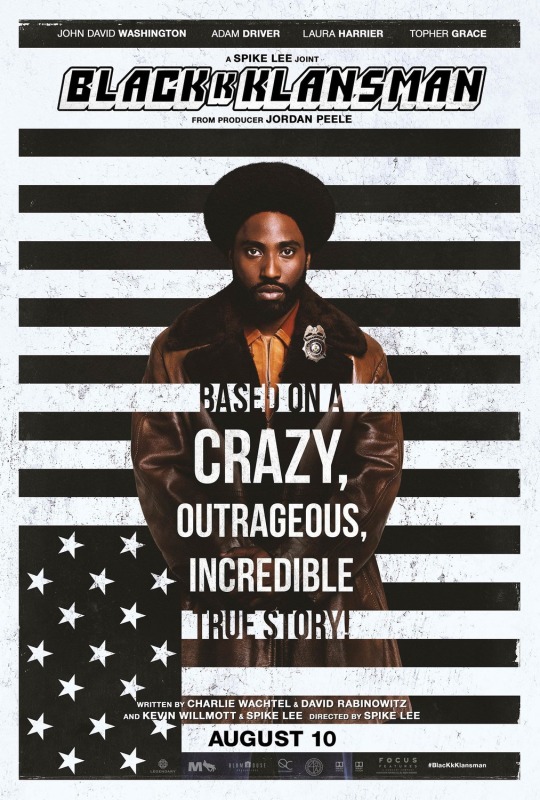
10. BlacKkKlansman
Not that I ever doubted Spike Lee had it, but after a few abstract offerings and documentaries, one wonders if their style can translate into an ever-expanding world of film language. Luckily for Lee, it seems the world has grown into his cinematic vision, with an older true story serving as the perfect backbone for many of Lee’s trademark tricks to be implemented for maximum effect. The ending will put you in tears if you have anything closely resembling a soul.
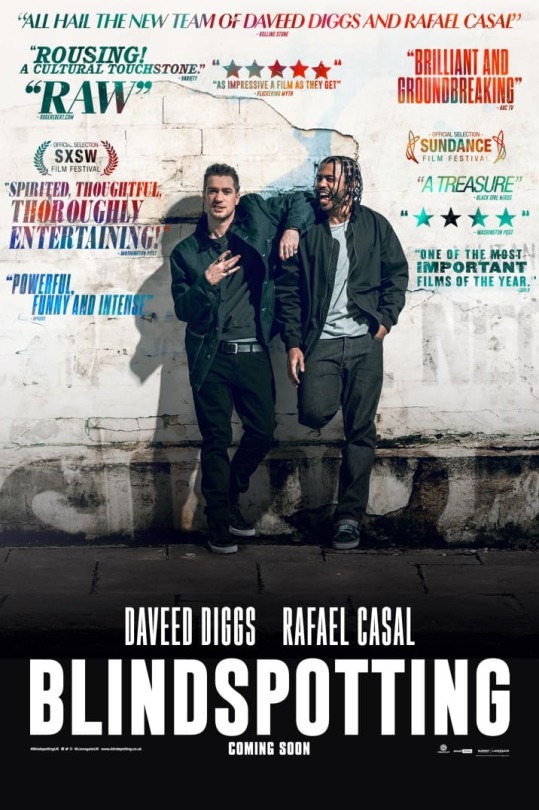
9. Blindspotting
This film really deserved a bigger run than it got, as it hit race relations of today on the nose without coming off as preachy or heavy-handed. Daveed Diggs proved that his charisma translated on both stage and screen, and his integration of hip-hop into both realms will hopefully have positive long-lasting effects. The chemistry between all members of this cast is kinetic, the story is told with perfect pacing, and the movie rides visual highs that match the narrative ones. I would love to see this movie receive some high-degree nominations.
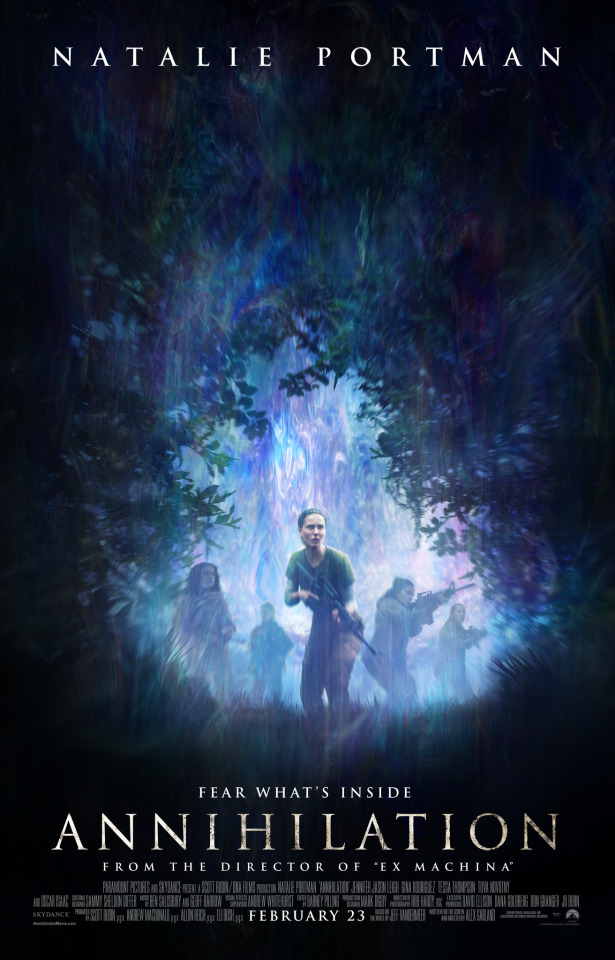
8. Annihilation
I came into 2018 with high expectations for this film, as I’d spent the previous 16 months or so completing the Southern Reach trilogy in its book form. Then I started hearing things about the production and the release that gave me a bad feeling : a Netflix distribution deal that seemed to all but kill a true theatrical run, trepidation from the studio in regards to the director’s vision, and other whispers that attempt to sink a film. Then I saw this movie, and was taken away to a completely different world. We may not be getting a faithful, trilogy-length adaptation of the series anymore based on what happens in Annihilation, but if these are the moments I’m left with, I’d consider myself happy in the long run.
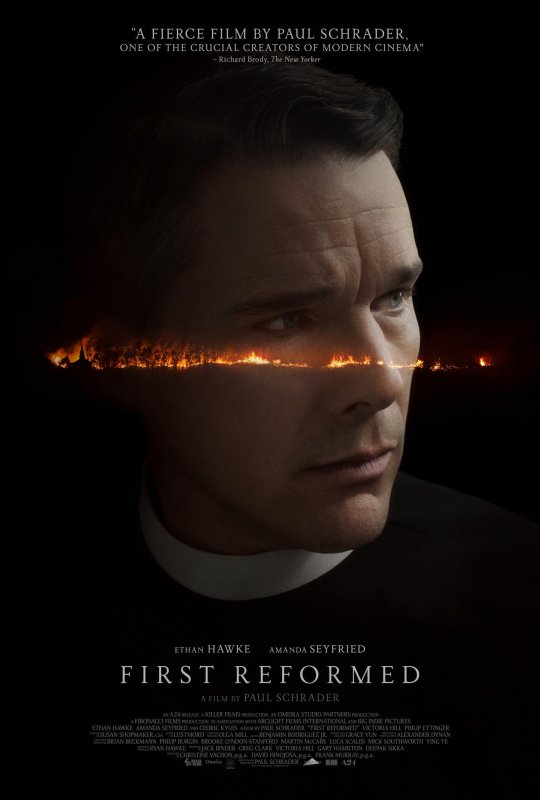
7. First Reformed
It took me longer than I intended to get around to this one, but knowing that Paul Schrader wrote and directed it made it a must-see. The film was drawing comparisons to Taxi Driver (not a surprise, based on the aforementioned Schrader involvement), and surprisingly, it more than lived up to that hype. The tension is equal, but updated to reflect the times in a way that could impact any of us.
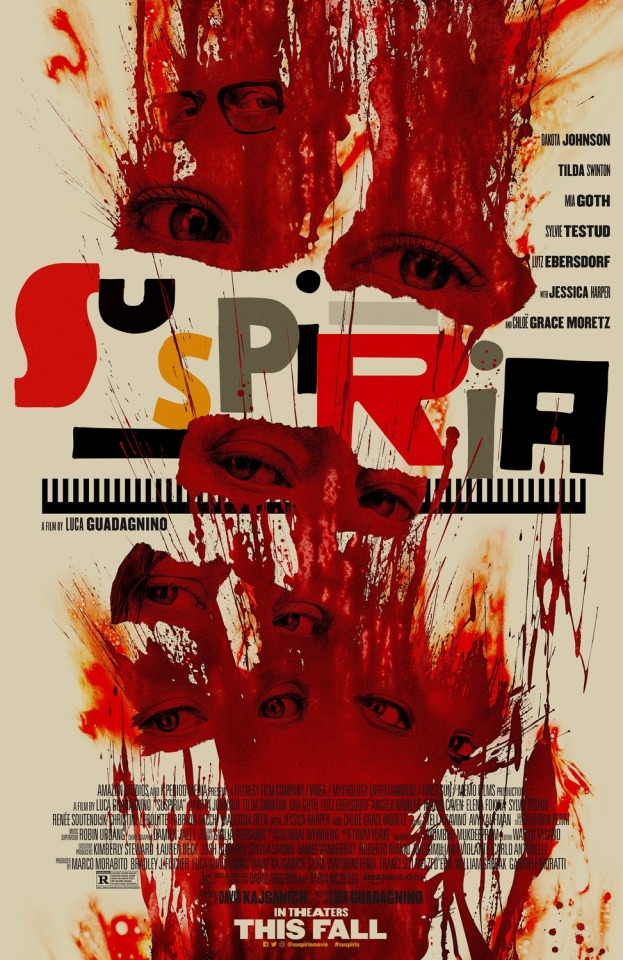
6. Suspiria
This movie will make it extremely hard for me to blanket-debate against remakes simply because it does all of the right things in regards to updating a classic. The film does not rely on existence as a new millenium version of an old film... rather, it boldly takes concepts only touched upon in the original and fully embraces them, presenting a true psychological horror gem in a year full of them. The film also looks amazing on top of everything, which was a high bar to meet considering the original movie is basically driven by its visual style. A 2018 must-see, film buff or not.
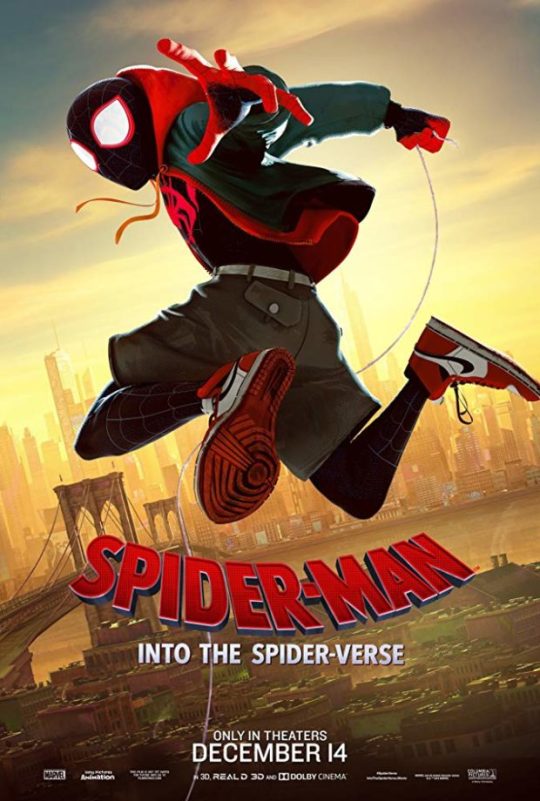
5. Spiderman : Into the Spider-Verse
Easily the most fun I’ve had in a theater all year. I was blown away by the animation, and can’t wait to see further installments of the Spider-verse specifically to see how that enhances over the years. There was such a high volume of homage and Easter Egg placement in this film that it warrants repeat viewings, and it was one of a handful of films that I wanted to instantly own as I was walking out of the theater.
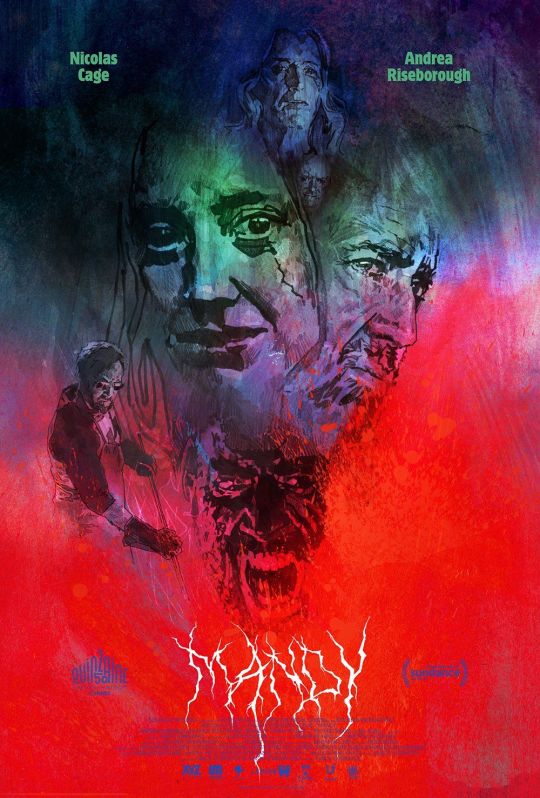
4. Mandy
Like Spider-Man : Into the Spider-verse, I wanted to own this movie the second I walked out of the theater as well. The trailers intrigued me, a recommendation of Beyond the Black Rainbow fully sold me, and the final product did not disappoint. This film certainly is not for everyone, and funny enough, the two biggest aspects that would place it on that ‘not for everyone’ list sit in opposition of one another : the film is a bit indulgent on the style at the sake of what would be considered normal pacing, and it has some extremely violent moments. That being said, Mandy is easily one of, if not THE, most beautiful films of the year.
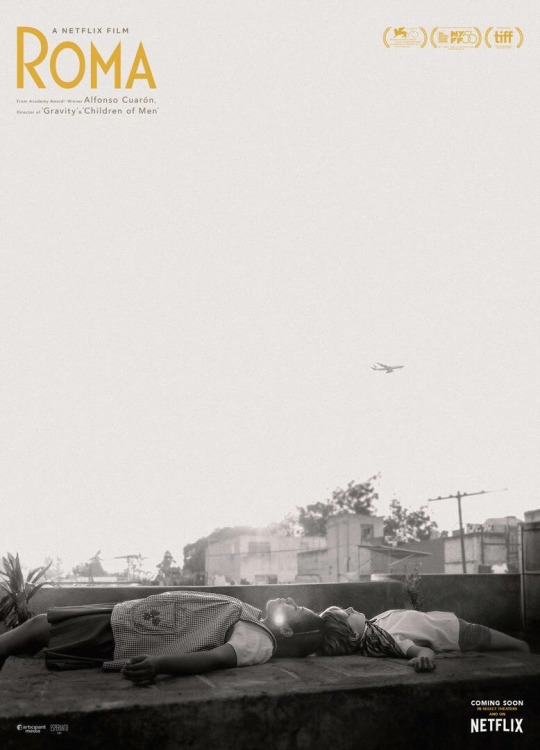
3. Roma
This seems like the closest thing to a Fellini film that us modern day film lovers will ever get. The story itself is intriguing, as it juxtaposes class issues, political issues and the barrier of trying to raise a family in a crazy world all in an intriguing tapestry. The cinematography is calculated, observational, and the choice to film the movie in black and white adds an instant timeless quality to it. Director Alfonso Cuaron even manages to get in a little cinematic and visual humor, albeit mostly subtly, but it definitely pays off if you’re in tune to what he’s doing. Easily one of the best pictures of the year, worldwide, and a party that I was certainly late to.
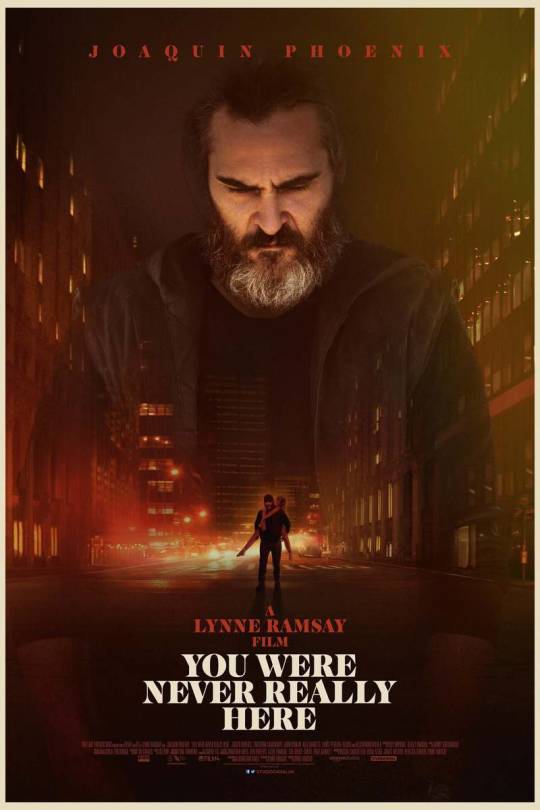
2. You Were Never Really Here
If Mandy is a bit too over the top for your tastes, then You Were Never Really Here may be the jarring experience you need in 2018. This film is almost as visually stunning, but the narrative is far more calculating, deceptive and intriguing, both on the surface and as you dig deeper. The hectic camera setups, editing and score put you in such a disjointed state of mind that Joaquin Phoenix becomes the only thing you can hang on to, and your involvement in his journey is completely immersive. In a year of performances that focus on the anti-hero, this film found a way to scrape to the top of the pile.
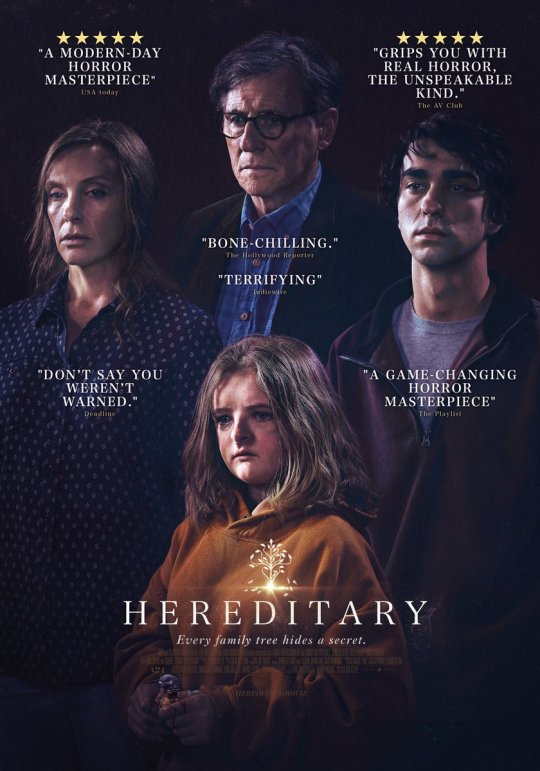
1. Hereditary
Something strange is happening here... who would have thought that a horror film would be my favorite film of the year? Hereditary is no run of the mill horror film, however... it treats its audience as intelligent, and there is so much texture in the film that it’s impossible to see it all without multiple viewings. The close of the first third of the film is horribly unsettling, but it propels the narrative forward so abruptly and intensely that you’re locked in from there out. A genius film, and an instant classic.
(Editor’s notes)
- Original post date : 12/27/18
- Revision date : 1/8/19 (Roma added to position 3, Black Panther moved to Honorable Mentions)
- Revision date : 1/10/19 (The Favourite added to Honorable Mentions)
- Revision date : 1/22/19 (Suspiria added to position 6,Avengers : Infinity War moved to Honorable Mentions)
#ChiefDoomsday#DOOMonFILM#TopFilms2018#Damsel#TheEndless#IsleOfDogs#Mid90s#Thoroughbreds#BlackPanther#BlacKkKlansman#Blindspotting#AvengersInfinityWar#Annihilation#FirstReformed#Spider-ManIntoTheSpider-Verse#Mandy#YouWereNeverReallyHere#Hereditary
11 notes
·
View notes
Text
Anti-Villainy & Well-Intentioned Extremism
Every villain is a hero in his or her own mind… but there are some villains who take it to a whole new level. Some villains actions would be, if done by just about anyone else, a truly heroic deed… but the villain, being a villain, goes about achieving their heroic goal in a less-than-savory manner. This is the mark of a Well-Intentioned Extremist, a villain who believes the ends justify the means and that a wicked action that achieves a good goal is worth it. A lot of anti-villains tend to be like this, and one in particular sparked the idea for this essay: Thanos.
Thanos in the Marvel Cinematic Universe has been criticized by many as having an utterly nonsensical plan, one that is nowhere near as compelling as his dudebro-esque obsession with Death that he has in the comics. They say his goal to wipe out half the universe so there are more resources would fail horribly due to basic math, and that his plan is doomed by his shortsighted idiocy and he could have just solved the problem by doubling all resources. This last part is actually entirely correct. The issue is they are using it as a criticism, when it is in fact the whole point.
The thing with Well-Intentioned Extremist characters is that, while their end goal could be considered a good thing, if you want the audience to still view the character as a villain you need to be sure to show that, above all else, they could have entirely avoided the entire plan if not for their own hubris, their desire for vindication. Let’s go through a few particularly famous examples to clarify what I mean:
First, and most famously, is Adrian Veidt, AKA Ozymandias.

Veidt is the antagonist of Watchmen, and he sets into motion a convoluted scheme to save the world from nuclear annihilation at the height of a Cold War where Nixon is still running the country. There is absolutely no denying that Adrian Veidt’s attempt to unify Russia and the United States as comrades-in-arms to prevent the end of all life as we know it is a noble goal… but how does he go about it?
He sends a gigantic genetically-engineered alien squid creature with a cloned psychic brain that acts as a psychic nuke to wipe out half the population of New York. He does all this to trick the world into thinking that aliens are invading, and that they need to band together to fight them off if they ever come back.
Now, the end goal is obviously good, but the means he used to achieve it are incredibly awful, and even he knows it. All of this is what makes him a compelling character… but he is tragic, and it’s all the more tragic to think that this all could have been easily avoided if he was not so desperate to keep himself from being “the smartest man on the cinder,” as the Comedian put it so eloquently years prior to the events of the story. Look at what he accomplished, all in the name of his plot: he managed to engineer a monstrous squid creature, utilize the brains of human psychics as well as nightmarish images created by artists, all to create a massive psychic nuke to trick the world. All this and he also managed to cause a being with godlike powers to give up on the world so he could pull this all off unhindered, and he managed to kill everyone involved neatly and without error, with only one loose end that may or may not even matter in the long run. With all that said… considering all he did, is there truly no other way he could have gone about this? One with minimum loss of life? The man was an absolute genius who accomplished some of the most stunning leaps of genetics imaginable… and his grand plan to save the world was mass murder? This is part of the tragedy of Veidt, obviously; his hubris blinded him, the complexity of his plan and his own ego blinding him to the fact that there could possibly have been a myriad other ways to resolve the issue. He could not be wrong, so he had to prove himself gruesomely, painfully right, no matter the cost.
And as any good Well-Intentioned Extremist, in the end he ruminates on whether or not it was all worth it… much like Thanos does at the end of Infinity War, interestingly enough. One can easily draw comparisons between Thanos being confronted by the child Gamora and Veidt’s final conversation with Doctor Manhattan, wherein both men come to grips with the fact that all they’ve done has cost them everything, and that it may not have been worth it.


Let’s look at another example: Senator Armstrong of Metal Gear Rising.

Armstrong is a bit different, in that he absolutely, unabashedly views his “might makes right” philosophy as a good thing, and never really has a moment where he realizes the wrongness of what he’s doing; as he puts it, “Making the mother of all omelettes here, Jack - can’t fret over every egg.” And when you really think about it, his goal isn’t truly an evil one: he wants to end war as a business and stop men fighting and dying for causes they don’t necessarily believe in, instead wishing to create a world where each man fights his own battles, fights for what he personally believes. It’s obviously extreme, but it’s almost refreshing to see a politician who actually wants to put an end to war like that.
The issue, of course, is his use of child soldiers, his numerous terrorist actions, and his creation of a new Metal Gear, the eponymous mech of the series and that is without fail always a bad omen when it pops up. Armstrong’s actions are truly evil, and go towards a good end goal, and while he never has an epiphany - he actually dies feeling his beliefs are vindicated - his heinous actions are pretty obvious for the audience to pick up on. And of course, much like with Veidt, you have to stop and think: there HAD to be a better way.
This is a man running for public office who has the time to command a group of mercenary cyborgs, get a gigantic mech the size of a city block made, and is powered by NANOMACHINES, SON! There seriously had to be a better use of his considerable power and influence than false flag operations, assassinations, and beating up twinks on top of robots. With his considerable power and influence, and especially with the fact that a guy like him would have easily won the elections, he could have simply done things diplomatically, or at the very least have enforced his ideas through the Winds of Destruction. True, this is a lot more obviously evil and shady and would make him into even more of a corrupt politician… but is it truly that much of a price to pay when it means ending war as a business?
Of course, the reason he doesn’t consider other alternatives is obvious: his own personal beliefs and philosophies blind him to any other possible way. And again, this can easily draw comparisons to Thanos. Thanos as a character is driven to be vindicated in his beliefs; he watched his homeworld die, and though he offered what he thought was a reasonable solution, he was ignored, and left the last of his kind. This was long, long ago; at the point of his life in which he see him, he’s so completely and utterly consumed by his desire to be vindicated, his desire to see his idea put in motion, he no longer cares to consider all the issues, to stop and really consider what he’s doing, much as Senator Armstrong doesn’t care about the eggs he has to crack to achieve his goals.
And that brings us right to Thanos.

He is criticized for his shortsightedness, but there is reason to it, reason blatantly laid out in the film. He is criticized for ignoring the flaws in his plan, but being blinded by his own hubris is the exact point. And he is criticized because his end goal was changed to faulty logic rather than him being a bitter angry cuckold who can’t bang the girl he wants, which is… really, really bizarre. I’ve never really put any stock into any argument the MCU Thanos is a bad villain, but it really has dawned on me just how completely and utterly people are missing the point with his character. Do people just not understand anti-villains or well-intentioned extremists anymore? We’re not supposed to think he’s right - he doesn’t even seem to think so in the end - and we’re not supposed to agree his logic is flawless, either; he’s called “The Mad Titan” for a reason. We’re supposed to be compelled that his own hubris, his own desire to feel vindicated, is blinding him and driving him to these shortsighted actions, actions that have completely set him up to fall. He is doomed to failure because his actions, no matter how well-intentioned, were so heinous and ill-conceived that he managed to royally piss off the kind of people who were doing what he did better.
The road to Hell is paved with good intentions, after all.
#Essay#My Writing#Thanos#Senator Armstrong#Ozymandias#Watchmen#MCU#anti-villain#well-intentioned extremist
73 notes
·
View notes
Link
In this fourth article in the Continuing the Dialog – Take 2 Series, I am dealing with my hate-mailer’s decision – to respond to the assertion that he is apparently mainly a stereotypical Anti-Semitic conspiracy theorist. His method this time is to resort to the common tactic of the Israel-hater – fiction. Here, he makes the fictional claim that the Jews are trying to destroy Muslim holy sites. And he does this, while simultaneously depicting the Arabs as the party in the Arab-Israeli conflict who are wonderfully respectful of the holy sites and beliefs of others.
To wit, my hate-mailer’s remarkable retort: “Palestinians couldve destroyed Jewish temples and the holy wall Jewish people have in Jerusalem like what Israel is doing at the moment by digging under al aqsa mosque, but they didn’t, even though Muslims ruled the place for centuries they never hitlered Jews.”
****************************
It is also amazing, that in trying to counter the claim that you are a hateful conspiracy theorist, that you bring up another absurd conspiracy theory – one that has over the years resulted in many Jews being killed – namely the libelous claim that Jews are somehow trying to destroy Al-Aqsa. It is also surreal that you are comparing Israel’s respect for other people’s holy sites and trying to claim that Arabs fare well in comparison.
As a preliminary matter, let’s address your claim that “palestinians couldve destroyed jewish temples and the holy wall.”
First, the idea of a Palestinian people did not even come into existence until the 20th Century. Second, going back over at least the last 500 years (with rare exceptions that do not bode well for Arab respect for Jewish holy sites), Arabs rarely had any control over Jerusalem or any of the holy sites in the land of Israel. Second, the notion that Arabs treated our holy sites with any semblance of respect is laughable. Under the Ottomans from 1517 to 1917, access to the Kotel (Western Wall) was greatly restricted and under Jordanian control (from 1948-67) it was essentially treated like a place for dogs and donkeys to go to the bathroom (and it has never [EVER] been under “Palestinian” control).

That the Arabs and Ottomans, however, never destroyed the Kotel is certainly nothing to brag about considering that the Western Wall is the base wall for the Temple Mount itself and destroying the Western Wall would destroy not only the holiest site in the world to Jews, but also the Al Aqsa Mosque and Dome of the Rock (which were built literally on top of the holiest site in the world to Jews and at the site of the two ancient Jewish Temples in Jerusalem). As an aside, if you ever want to know who are the colonizers and who are the colonized, just look at which party builds their holy sites on top of the others.
As for your claim about Jews trying to destroy Muslim sites by “digging under Al Aqsa Mosque” this claim is part of a very old and hateful Anti-Semitic canard that the Arabs have often deployed in order to gin up hatred against Jews. Sadly, there’s a long history to Arab claims that Jews have threatened (or as you claim, are threatening) Al-Aqsa, dating all the way to at least 1921. These claims have always been proven false, but often not before Jews have been murdered as a result. These claims are mendacious. Part “call to arms,” part conspiracy theory, and ironically, part very obvious psychological projection, due to past actions against Jewish holy sites that fell into Arab control.
The Nazi collaborator, and Mufti of Jerusalem, Haj Amin Al-Husseini, was one of the early adopters of this libel. His claims back in 1928 and 1929 that the Jews were seeking to damage Muslim holy sites, including Al Aqsa, led to numerous Arab riots and massacres, including the massacre in Hebron in 1929 that led to every Jew in Hebron being murdered or ethnically cleansed from the city. These same claims in more modern times – always utterly fake and with no credible evidence behind them – have often served as the basis for more recent violence against Jews, with numerous perpetrators of the stabbing attacks of the last 2 plus years – as part of the “knife intifada” – claiming that they decided to stab a Jew in order to “protect Al Aqsa.”
It is sad, that while these lies are so plainly false and absurd given the way Israel and the Jewish people actually treat all peoples’ holy sites; the Arabs in the region, having been inundated all of their lives with Arab and Islamist Supremacist hate for the other (and in particular, the Jew) so readily believe and act on those lies (often violently).
Let’s look at the reality of how Israel has treated and respected Muslim holy sites. First, right after liberating the Old City of Jerusalem from its Jordanian occupiers, Israel handed control of the Temple Mount to the Islamic Trust, or Waqf, and forbade any Jewish religious rite on the entire Mount (not just in the mosques), a “status quo” it has maintained to this day.
So, after vanquishing in barely 6 days three enemy countries who were promising a war of annihilation against Israel just a few days earlier, and after liberating the Jewish people’s holiest site, Israel proceeded to immediately hand religious control over that site to those same Arabs who had been promising to exterminate us. Can anyone credibly imagine Israel’s enemies being so benevolent?
Second, Israel has not conducted any excavations, archaeological or otherwise, under the Temple Mount, the Dome of the Rock or Al Aqsa. The only significant excavation in recent times was actually carried out by the Islamic Waqf on the site formerly known as Solomon’s Stables, now the El-Marwani Mosque. And that excavation by the Waqf was a crime against history and archaeology, where the Waqf oversaw the massive destruction of over 3000 years plus of archaeological treasures. So other than in the fantasies of the Anti-Semitic conspiracy theory addled brains of the Israel-haters, there is simply no basis for the claim that Israel is “digging under Al Aqsa.”
Third, Israeli control of the Old City of Jerusalem in the last half century has meant that for the first time in centuries there is absolutely full freedom of worship for all religious beliefs and practices in Jerusalem. Can the same be said in any Arab controlled lands?
As for the other absurd part of your claim that – “palestinians couldve destroyed jewish temples and the holy wall jewish people have in jerusalem like what israel is doing at the moment” – you really need to just do a modicum of research into your claims before you reduce them to writing.
Upon the Jordanian Arab Legion’s capture of the Old City of Jerusalem, after all of the Jewish residents were forcibly expelled, the Jordanians destroyed 58 synagogues, and looted and desecrated their contents. In fact, one of the synagogues which were maliciously destroyed, the famous Hurva synagogue, was where my grandfather had his Bar-Mitzvah in 1913.

The Jewish cemetery in the Mount of Olives, where we Jews have been burying our dead for over 2,500 years, was desecrated, and over 38,000 tombstones were smashed and used for building material, paving stones, or for latrines in Arab Legion Army camps. The Kotel (Western Wall) was turned into a slum area and Jews were not allowed to visit there.
More recently, Palestinian Arabs, when given any semblance of control over Jewish holy sites have resembled more the Taliban blowing up Buddhist cultural treasures and ISIS’s rampage over Christian holy sites than the tolerant pluralistic beings you seem to fantasize about.
On October 7, 2000, after constant attacks by Palestinian mobs since the Palestinian Authority was first given control of the area in 1995, the Jewish holy site of Joseph’s Tomb in Nablus (Shechem) was sacked and burned. Five days later, the ancient Shalom Al Yisrael synagogue in Jericho was sacked and burned too. And the Waqf, as described above, in order to complete new underground mosques under the location of the holiest site in all of Judaism, closed off the Temple Mount entirely to any archaeological oversight by the Israel Antiquities Authority, used massive earth moving equipment and dump trucks (when they should have used archaeological tools and tooth brushes) and removed to city garbage dumps some 13,000 tons of rubble from the Temple Mount that included countless archaeological remnants from the First and Second Temple periods.
Bottom line, any claim that Israelis (or as Mahmoud Abbas recently said “the Jews with their filthy feet”) are desecrating Arab or Muslim holy sites or endangering such sites is based on two things – massive Jew-hatred, which has sadly infected a large part of the Arab controlled world (as viciously as it had gripped large parts of Europe in the first half of the 20th Century) and a classic case of psychological projection. It is hateful and libelous. It is also, as evidenced by the dozens of Jews killed by Arabs motivated to murder and riot by such libels, extremely dangerous. You should be ashamed of yourself for propagating such libels.
Unfortunately, you are probably beyond shame or redemption on these issues. But one can hope. After all, “The Hope” is the name of Israeli national anthem.
24 notes
·
View notes
Text
@starkunlimited
He’s been here, out past Natick at the old power junction, assessing its viability as a place to plant people in a permanent home (and deciding, yeah, it’ll do - the fence and the remaining buildings are the deciding factor on that), for about a week, outside of the scope of any other settlement he can recall right off hand, in a place no trader wanders through (yet), and he finds it really hard to believe that he hasn’t been a pain in the ass to locate.
His first instinct is to hold the ghoul that’s turned up out of nowhere at gunpoint, because the wasteland has taught him many things since the bombs dropped, and on that list of things is to be wary of strangers, because not everyone wants to make friends. Some will kill you for the caps in your pocket, no matter how few they might be. Some will do it for the pleasure of it. There’s always rumors of ghouls turning feral, but it’s not one he puts a lot of stock in, since he’s never actually seen it happen for himself. But the wasteland has made him wary, suspicious, and it takes more than a few seconds for things to connect. That there’s something entirely, uncomfortably familiar about the raspy voice, the stance and posture, the way she carries herself.
“L-” No. No, no, it can’t be. It shouldn’t be. Ghoulification is a form of immortality, in a sense, as much as the arc reactor sitting in his chest has been, but it’s a fate he doesn’t think he’d have wished on anyone. “Liz? Liz Swann?”
The moment he says her name, he knows it’s true. And isn’t that something that leaves him with a mishmash of conflicting feelings. As much as she’d been a pain in his ass before the war, she’s alive. She’s still upright and breathing in this shitsack world, something familiar and from home. It also explains, yeah. If anyone could track him down on nothing at all, it’s her. It’s always been her. He has no clue how she’s always managed it, but he doesn’t doubt for a second it wasn’t that big of a deal. On the other…Ghouls don’t have it easy, not with the way people can be suspicious and bigoted in the name of survival out here. He lowers the laser pistol, from where he’d drawn it on her from his perch on the catwalk of the oversized warehouse, not sure if he should apologize for her current state of being (because isn’t it - at least partly - his fault?) or make a joke.
“If you’re here to mooch again you’re, like, two hundred years too late.” He starts down the rickety metal steps, ignoring the way they sway and move under him. Those’ll have to be replaced. “I’ve got a handful of caps and a half empty bottle of Mezcal I found and it’s mine.” His feet find the overgrown floor of the warehouse and he breathes a silent sigh of relief: At least the whole thing hadn’t shaken apart under his weight.
“Where the hell have you been.”
in actuality, it hadn’t been easy-- but well, he hardly needed to know that. she had hardly believed it when she first heard the rumors, but when faced with so very many rumors she could hardly resist the siren call of curiosity. link by link, person by person { or at least, those willing to speak with things like her } she had followed the rumors to their root, and well. wasn’t that a helluva surprise.
though, she really shouldn’t have been surprised-- if anyone could possibly survive nuclear annihilation, then 250 years of irradiated hellscape afterwards, it was Tony Stark.
the apocalypse had taken everything from her. her friends, her purpose, her life-- even her body, leaving her nothing more than her brain and a rather hideous collection of scars and smells. how could she be expected not to take back what she could? even petty revenge was revenge. the caps in her pocket, the swords on her belt, the rifle over her shoulder. it paled in comparison to life before the end of the world, but she had managed to do well enough for herself and reclaim her existence from the fallout. she had always been greedy, hungry for more-- she would take back whatever sliver of her life she could-- even an annoyingly moralistic do gooder irritatingly snarky and infuriatingly brilliant sliver.
“ in the flesh. “ elizabeth smiles, a fraction of the tension melting from her shoulders, relaxing her stance as relief washes over her. at the same time, something tightens in her chest. after all this time, even with this body. he had recognized her. she really hadn’t thought he would, genius and all. she certainly wouldn’t blame him if he hadn’t-- she barely recognizes herself most days. but he recognizes her, and it hurts, and it’s bittersweet, and warm, and it very nearly makes her want to cry.
“ here and there. “ two hundred and fifty years is a long l o n g time to fill. society was gone and most of the world with it. while her career choices had left her better prepared for the apocalypse than most, the learning curve had been steep for everyone. navigating the wasteland was difficult at best and in spite of her..... condition, death was never too far away.
“ most recently in goodneighbor. “ goodneighbor suited her. and considering her current state of appearance her housing options were rather limited, weren’t they. at least in goodneighbor, she was just another ghoul rather than the most frightening thing in the room.
“ miss me? “ she smiles, mischievous, teasing him just like in the good old days. she had definitely missed him-- though she hadn’t quite realized exactly how much before having Tony in her life became an actual possibility again. standing before him, seeing that he is real and flesh, and somehow miraculously alive feels like a victory-- something the war hadn’t managed to ruin, to steal away.
1 note
·
View note
Text
This is the most consequential injury in sports history
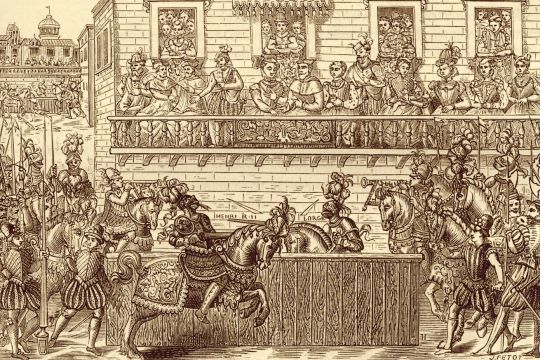
The death of King Henry II in a jousting tournament sparked a series of wars that lasted 32 years and killed three million people
On June 30th, 1559, King Henry II of France entered the lists at a three-day tournament celebrating the marriages of his sister and daughter*. Henry’s presence in the lists was unremarkable. He was a familiar presence at tournaments, sporting the colors of his mistress over his heavy jousting armor, and he was a formidable, skilled opponent as well. Late in the day, however, he was nearly knocked off his horse by Gabriel Montgomery, the captain of his personal bodyguard.
*To different people, not each other. Just in case that wasn’t clear.
That might have been the end of the action, but the king was enjoying himself, and asked for another bout. Montgomery refused. But Henry II insisted, despite the protests of his wife, Catherine de’ Medici, and the pair took another tilt.
This time things went badly wrong. Montgomery’s lance pierced the king’s helmet. Jousting lances were built to shatter on impact, as a protection against impalement, and that’s exactly what happened here. Unfortunately for King Henry, it did so after entering his helmet, dissolving into a mist of splinters that ripped into his face and neck. The longest drove directly through the king’s right eye and penetrated into his brain.
Before King Henry lost consciousness the distraught Montgomery offered his own head as punishment but was turned down. Doctors rushed to extract the splinters, hoping that they might effect a recovery, but sepsis quickly set in and nothing more could be done. Ten days later, King Henry II died in what I can only assume was agony. The Dauphin, 15-year-old Francis, assumed the throne.
The tournament did not exactly have an unblemished history. When they were first introduced, they were little better than the battles they were intended to mock. Knights could capture their opponents and hold them to ransom*. Deaths and injuries were common, exasperating the Church to the point that, as Maurice Keen relates in Chivalry, the Archbishop of Magdeburg excommunicated everyone who participated.
*These ransoms were often lucrative. Some individuals, most notably William Marshall, actually earned their living this way. By any reasonable standard, they were therefore professional athletes.
The great 12th-century poet Chrétien de Troyes describes the confusing melee of his era (from Keen):
On either side the ranks tremble and a roar rises from the fight. The shock of lances is very great. Lances break and shields are riddled, the hauberks receive bumps and are torn asunder, saddles go empty and horsemen tumble, while the horses sweat and foam. Swords are quickly drawn on those who fall noisily, and some run to receive the promise of a ransom, others to stave off this disgrace.
But it’s important to remember that by the time of Henry’s death, the tournament had been around for hundreds of years, and had evolved into something completely unrecognizable. The ‘little battles’ of the 12th and 13th centuries had transformed into ritual combat, with the ritual of the joust first separating from and then supplanting the martial mess of the general melee.

Universal Images Group via Getty
Jousts were far from safe, but they were far less lethal than tournaments at large. Thanks to pressure from the Church as well as the chivalric tendency towards showy affairs of honor, jousts became increasingly ritualized and elaborate. Barriers were placed between contestants, allowing greater control of both horse and lance. As war moved away from the knight and his tools, jousts were free to develop as an end in and of themselves; Henry II’s specialized armor, which would have been useless on the battlefield, was designed for almost total protection at the tilt. Almost.
By the 16th century, jousting was an anachronism. Knightly combat was a thing of the past, chivalry no longer much pretended at. The sport staggered on through sheer inertia, but it had no grounding in anything but noble nostalgia, and was ripe for a crisis. The death of a king during a tournament was such a crisis; 1559 marks, in a very real sense, the end of the sport.
The death of a whole sport was one thing. But Henry II’s fate didn’t just impact the future of jousting. As it turned out, he was sitting on a powder keg, and without a powerful king on the throne, it ignited.
French factionalism was nothing new. Mutual antagonism between the reigning house of Valois and the the Dukes of Burgundy had left the country perilously close to defeat in the Hundred Years’ war a century prior to Henry II’s death. This time there were two major families vying for dynastic power: the Houses of Condé and Guise. But unlike previous spats, history had thrown a new and entirely unexpected wrench into the equation.
In 1517, centuries of nearly-undisputed* confessional unity in Western Europe came to a juddering halt when an achingly horny Augustinian monk suffered a crisis of faith. Martin Luther’s resolved that crisis through a moment of inspiration. Humanity is not absolved of sin via good works. Salvation is attainable through faith, and faith alone. The message spread like wildfire; the Protestant Reformation had begun.
*One rare exception was the Cathars, a sect which flourished in the French Pyrenees before being annihilated in the Albigensian Crusade. I mention them mostly because I used to live near their strongholds, which are fiendishly cool.
The Reformation gave the rivalries between the great houses a confessional dimension which had never before existed. France was on the front lines, a meeting of the Catholic south, Lutheran Germany, and the Calvinists ensconced in Switzerland. Henry II had responded to the rise of the French Protestant ‘Huguenots’ with brutal repressions — he was a strong king, not a good one — which did nothing to halt the conversions, including many from the nobility.
The situation deteriorated quickly. The Guises dominated at court to a degree which provoked enormous jealousy, leading to a 1560 conspiracy to kidnap King Francis II and eliminate their influence. The conspiracy was detected, and the Guises decided that the Prince of Condé, a Huguenot, was to blame. He was arrested and scheduled for execution, but was released upon the young king’s death that December.
At this point, the French throne passed to Henry II’s second son, Charles IX. He was ten years old. De’ Medici took over as regent, and attempted to smooth over relations between the warring houses while also ensuring that neither party could attain enough power to overwhelm her or her son. She failed, and the July Edict of 1561, which promised a form of religious tolerance, was ignored. The country fell apart on doctrinal lines, descending rapidly into a civil war.

Photo By DEA / G. DAGLI ORTI/De Agostini via Getty Images
The conflict included events that still invoke horror today: the St. Bartholomew’s Day massacre, for instance, was a country-wide riot in 1572 which led to deaths of as many as 30,000 Huguenots, radicalizing the remainder and crystalizing mistrust of Catholics across Europe (for good reason — Phillip II of Spain, soon to launch the Armada against Elizabethan England, found the massacre so amusing that he laughed for what is said to be the only time in his entire life).
This isn’t the time to recapitulate decades of French civil war, which would take forever and is also a region of history with which I’m not intimately familiar. But to take a panoramic view, the Wars of Religion lasted 32 years, three kings and claimed the lives of something like three million people.
Much like the assassination of Archduke Franz Ferdinand in 1914, Henry II’s accident can’t be considered strictly causal to the conflict that followed. The Reformation had set the stage for religious warfare across the whole continent (the biggest, the Thirty Years War (1618-1648), made French efforts look paltry by comparison), and even the slightest pretext was going to be enough to set it off. Had Henry survived, it seems vanishingly unlikely that France would have escaped the conflagration which the friends and enemies of Reform had engineered together.
But the lack of royal power was a key factor in prolonging and amplifying the wars. Without that tournament — ironically, the weddings it celebrated marked the end of war between France and Hapsburg Austria — the shape and duration of the French Wars of Religion might have changed dramatically. It’s not a stretch, then, to call his death the most consequential sports injury in history.
The comte de Montgomery, meanwhile, ended up joining the Huguenots, survived the St. Bartholomew’s Day massacre and fought the Catholics at Rouen and La Rochelle before his capture in Normandy. The Queen regent had never forgiven him for her husband’s death, and she decided to take him up on the offer he’d made in 1559. I imagine that, as the axe descended, Montgomery felt some regrets over his poor aim.
0 notes
Text
Trinity Prime Bio
TRINITY PRIME:
"State your name for the record please,' the MP said in a shrewd manner.
"First Sergeant of the 8th Recon Division, Britt Lash"
"Would you mind telling us your account of what happened, Sergeant Lash? Just start at the beginning. We have nothing but time here," a smirk formed as she finished her sentence.
"Well," Britt glared at the MP, her eyes calculating her body language, inventing the most efficient method of attack.
"I suppose the best place to start would be with my injury...," her thoughts trailed off into nothing as her mind entered an empty trance. The courtroom slowly began to melt away into a swirling mass of colors, pulling her consciousness further away from her train of thought. Her body was numb, her brain activity was uncontrollable. In front of her lied an ocean of turquoise with stalking figures of her past shuffling along the current. Above were dazzling lights dancing in the sky, strewn about like fireworks, yet organized into distinct patterns. In the distance an impending storm brewed, a calling card for uncertainty. These were Britt's memories, all laid out in front of her. Anything she had been awake to witness, all ripe for the picking.
This was 'Cerebrostimulatransportantulam' as the scientists who devised it had dubbed. Most just called it 'The Process', as to avoid unnecessary hardships with investors. The goal of this 'Process' was to project a person's memories into a virtual reality, which could be viewed by a spectator as the person relived their memories. Humans were rudimentary liars, even the truth we believed to be so could inadvertently become a fabrication. Theories first began to circulate around exploiting the weakness of the body. A host to the predictable, an undeniable logistic that bore no deception. It could be studied, and with any reasonable amount of studying comes experimentation, manipulation. The path to discovery is not a pretty one, its foundation is paved with pain.
When science had first sought to infiltrate the human mind and unlock the secrets within, it began with the heart. The pulse. The body knew what it wanted, and the thrill to chase was all too tempting. Surprisingly the mind had shown great resistance, as proper breathing and circulatory control could shroud the treasures buried within. Once technologies began to improve, working in conjunction with our primordial inner functions, electrical impulses were the next tumblr in the padlock to human nature. Still, meditation and even more circulatory practice could divert the siege and ultimately fool the current. Ages went by, psychology was the leading power in deciphering human nature. Reading patterns, uncovering trends, maintaining meticulous social records were the tools of the trade. Technical science had been focused on other aspects of life. Medical research for curing illnesses and delaying the inevitable death were what sated curiosity. The absolute mind was a sacred thing. A holy machination not to be tampered with by mere man.
Or at least that was the norm until about a century ago. Now with an uncanny need for the truth, the Empire flooded this once forgotten practice with grants beyond comparison. The higher echelons of society were tenacious for the truth, the immutable truth. They had to know, and were prepared to go to any lengths necessary. That's where The Process comes in, a most depraved experiment that renders the host disabled. Fatalities were not uncommon, especially in the early stages. It had been a known fact that the human body had physical limitations. That was the trick to the unyielding mind. Candidates were kept for months, even years in isolated conditions, subjected to the most gruelling of training. The death toll was macabre, even some territorial conflicts would be put to shame. For the survivors, hope was not a luxury to be had.
That being said, the results were satisfactory for the Empire. Espionage, terrorism, even criminal tendencies were wiped off of the bloody slate. Information was priceless, and they had created a dystopian monopoly.
For Britt, the future decided for her was a fate worse than death. She had been unfortunate enough to meet a Tenno without authorization. Making her a prime candidate for The Process. The officials in the Empire were always interested in how the Tenno preformed during missions. Any prospect into that world was invaluable towards their decisions. In Britt's case, it occurred while she was working in the field on Phobos. She and her team were ambushed by a platoon of sentient fighters. Their power was superior to even an entire army, let alone a squad of scouting surveyors. They were annihilated in seconds, their bodies rained down in a sea of crimson. Britt barely survived the massacre, fleeing to a nearby storage facility, the Sentients not far behind. She had lost too much blood, her limbs were close to being crippled. She took out her knife and started to cut her throat, but as she slashed the wounds healed immediately, almost like magic. She stabbed herself in the heart, retching in pain. To her disbelief, the blade fell out and the once-bleeding crevice was closed, not even a scar. She heard the sounds of an ongoing battle outside; moving to investigate she discovered a field of bones and scorched patches of rock. She looked around, finding no traces of her pursuers or another party. With determination she headed off towards her stealth cruiser, though a strange sound could be heard from overhead. She stopped and looked back to see a blur moving in on her. She tried to run, but a hand caught her and pulled her close, covering her in a heavy shield aura. Just as she embraced her would-be assailant, the ship exploded, sending flames and shrapnel towards the two. The G-force rendered her unconscious, and the vision ended.
"Hmm; so that would explain the discrepancies from her health records," Morrison stated with curiosity.
"That's such a proper use of experimental technology, leave the ones who have to deal with the aftermath in the dark," snarked Johannes.
"Easy, Gabriel. We're just here to gather information. Besides, we've our own calling to worry about."
"Yeah," Johannes sighed. "I just wish that I could know for certain that my family was in safe hands. We may be in charge of cracking the mind vault, but that doesn't mean that we can read the minds of the Empire. I mean, just look at her," he motioned towards Britt, encapsulated and submerged in a tank of salicylic acid, with thick cables jutting out from her neck. "What's the point of these ground-breaking discoveries if all we are ordered to report is relatively useless data? Shouldn't we be trying to find solutions to our problems? And not just ours, but the Sentient's as well? For Christ's sake there doesn't need to be a war in the first place!", Johannes exclaimed.
"Alright, Gabriel," Morrison said now frustrated. "Why don't you tell me how exactly we plan on doing that with our current methods?"
"Well, I uh...," Johannes stammered.
"No that's correct, you can't tell me. You know why? It's because we were thrown into this like everyone else. We don't have time to spout such philosophical bullshit. We need to act. Don't get me wrong, I wholeheartedly agree with you, but why don't we clean up one mess before tackling another?", Morrison shouted now shaking with anxiety.
"I just don't even know what we're doing here anymore," Johannes said, staring at Britt as her body convulsed before settling in place.
"She'll be back up in about ten minutes, that Warframe really gave her a blessing. Well. More of a curse in our hands," Morrison said woefully. "Why don't we take a break, Gabriel? I think we're both at our wit's end."
All rights reserved to Julio J. Ramirez (ramirezjj72195)
1 note
·
View note
Text
Time is of the essence
Timing is everything. But you can only time it right by taking photographs. According to Moriyama, snapshots are all about capturing subjects’ expression, movement, and natural being in a particular moment. We kept this in our minds and wandered around the Hauptbahnhof Zürich. We took quick photos with any camera available. Sometimes it was the camera of a smartphone, other times an digiral camera… As long as one had the camera with them, the only thing that mattered was using it.
It is an annihilation. No meaning, no expression, no sense of the photographer. If I drain out the color, the only thing left is an impression. The brain works through it with imagination. It puts the missing pieces together. Brain creates reality. Just like with time. It is reconstructed by the brain. I try to get rid of themes. I just shoot whatever I find intriguing in that particular moment. I walk around. Stop and observe. I do not even look at the screen or the viewfinder. Sometimes I do, but often the best practises for capturing something natural, such as an expression or moment, is to not reveal that one has a camera with them. Most of the time the camera doesn’t even react to my touch. Especially in the rain. The screen is wet and won’t sensor the pressure of my fingers properly. I take photos. I ask questions. I walk a little bit more. I don’t have a theme. I don’t know what I am exactly doing, but by just living in the moment and exploring myself, the camera, the environment, I will come to a conclusion and find the meaning for this experience.
It is based on sequences, separated by durations of various lengths. I cannot say that I know what it is, but I am aware that it can be measured in different ways. I believe it is a subjective experience. To me it is something else and to someone else it is their matter. I cannot see it. I mean I can, but then I have to wait and compare. I can compare the positions of shadows from one point to another. But there has to be a period between the moments of comparison. I suppose I can feel it, but then again, not. I can recall the passing of it through my memories. It was that sunny day last summer. The summer before that was even hotter. Yesterday I did not sleep enough. Today I am more relaxed. Soon I have to eat, I am hungry. I complete this first, then I begin the next thing. There was an interruption. I am flexible. I change tasks as the opportunities arise. He is adaptable. She worries for the outcome. But that is in the future. Let’s talk about what happened. Time is linear. Time is Flexible. I am constant. We are now.
0 notes
Text
Idealism in Society
Our society thrives upon idealism. This false cultural idealism creates idealists. Advertising industries promote false idealism with this fascist agenda of pursuing mass-consumerism using exclusion tactics which threaten your societal yearn for conformity with materialism used as bait as though you're the fish in the sea. Eisenhower had the first political advertisement on television — "Eisenhower Answers America" — for his presidential campaign because he realized how television was becoming a consumeristic tool in which arose into popularity and into the households of citizens, and so he used this for his political benefit by communicating with consumers by pursuing his agenda. The doctrine of religion itself functions upon this ideology revolving around fear, guilt, and idealism, we cannot accept the nihilistic thoughts that derive from thinking about utter nothingness, because idealism gives us a form of hope but idealism opposes realism so when reality becomes a reality and your bubble is popped... idealism prevents your satisfaction, hence radical nihilism and conclusively, suicide. Despair comes from hope. Hope is idealistic nonsense when you realize that hoping is simply praying on your knees and making a gamble with your mind that your wishes come true because you can't grant your own wishes. When a family member is receiving medical treatment, you hope and pray, because you can't cure what confides their diseased body into a hospital bed. When the medical treatment isn't enough and the disease takes a life, you nihilistically despair because idealistic hope wasn't enough. Idealism makes us make the comparison for what we currently have and what we once had, and how we don't have what we had, and that makes us fall into a ritualistic pit of nihilism. As this text indicates, anhedonic lifelessness has become positively glamorized for the sole intent of pity so, in a way, this societal campaign bears similarities with capitalism because celebrities brilliantly capitalize on cultural idolatry by emerging into our culturally-worshipped popular culture simply by conforming with trends... As this text indicates, anhedonic lifelessness has become positively glamorized for the sole intent of pity so in a way, this societal campaign bears similarities with capitalism because celebrities brilliantly capitalize on cultural idolatry by emerging into our culturally-worshipped popular culture simply by conforming with trends, singing about angst and having a physical appearance that... appeals. Stevie Nicks, for example, creates music that's downright angelic. I'd be fairly disappointed if you're not familiar with her name but she tours, releases albums and sings. A handful of prior icons still alive — Madonna, Marilyn Manson, etc. — still attempt at making music and not all their music is necessarily awful. Their impact is still cited as influential by the celebrities we use for our wallpapers but their existentialistic-selves are not... relevant. To oldies and other angsty retro teenage hipsters (including myself) they hold a form of value but popular culture rejects them entirely and replaces them with parodic versions of themselves.Our culture cannot be parodied because our culture is a parody of itself. Modern subcultures (including counter-culture) simply don't exist. You turn on the radio, the same artists are singing the same song in the same format until the same artists release another song in the same melodic format. Pat Robison yells at you about how corruption has infiltrated society with godlessness on the fascist consumeristic advertisements of television and then he asks for your credit card number. The fascist consumeristic advertisements that depict cars as godly, unhealthy sodas as the recipe for health, throwing female celebrities into a studio with a script by exploiting the beauteous appearance of their youth and targeting vulnerable teenage girls. Plato was correct about you fucking imbecilic brats, you consumeristic twats, you materialist scum, you moronic shit-for-brains, you idealistic moralists; you exemplify his philosophical cave allegory and if you're unfamiliar with his cave allegory, you are the reason he set forth such philosophy. Why does materialism define your persona? The brand of your shoes determine your worth, this urge for popularity at work or school tyrannizes with false idealism, your wallet speaks more than your mouth and love has become mere infatuations with the ideals of love. Brett Easton Ellis exposed the horrors of egocentricity in yuppie materialist asshats such as yourself in a satirical form that resembled such brilliance that Michael Tolkien himself declared the masterpiece as what Ralph Waldo Emerson defined genius as with a cultural backlash that arose literary controversy that we hadn't seen since Marquis De Sade raped his readers as much as he forcefully shoved crosses up the vaginal regions of womankind. I'm amused observing the pretentiousness of my youth. I simply utter these words when somebody degrades me and dehumanizes me solely for my appearance and libertine ideology. "Do you like Huey Lewis?" — with a nonchalant smile, they don't understand, before going on a rant about the pleasures of conformity and Whitney Houston, Phil Collins and eighties pop-culture. Idealism comforts us when a loved one passes away but realism is the only reality. Society — the coexistence of individuals with the deception of unification — has imposed an unconscious measurement scale with the highest form of worth/status being a celebrity. A celebrity mustn't just be a musician or actor/actress. Charles Manson is/was a celebrity because the camera's point/pointed in his direction, everybody watches/watched what the camera films/filmed and bam, we suddenly forget that John Kennedy signed Executive Order 11110 before his assassination. A measurement scale that determines your worth using numbers that define your intellect. I write about fifty pages in my novel in the point-of-view from a... character. I won't dive into the character because my novel does the explaining but he — for an interlude that lasts for more than fifty pages — thoroughly but disturbingly depicts how society functions. He mentions the unconscious scale of measurement that determines worth and realizes that he's worthless because he doesn't have the status of celebrity. He realizes that Mark Chapman killed John Lennon and that action determines his worth for eternity but if Mark Chapman killed a mother with no celebrity status (who'd leave her kid motherless) it wouldn't have any form of the impact except for the kids. He realizes that he's worthless — the lowest of the scale — and that gives him the most worth in society, that puts him above the highest, because he cannot shatter a status since he doesn't have a status and so this liberates him, this motivates his schizophrenic fantasies of annihilating civilization by wishing forced-abortions upon womankind so creation is an impossibility and castration clinics for mankind so furthering creation is even more of an impossibility, his murders starting as sadomasochistic but becoming lifeless afterwards. I'm not diving into details of torture or beforehand of storyline but (in simplistic ways of summarizing more than fifty pages) an unknown man — business card, suit, wallet — walks on an alleyway filled with hookers and rapes an innocent eight-year old (tortures her) in a stall but my character recognizes that he could justify his action with his business card that defines him, he recognizes nihilism as he doesn't moan or tease his victim but simply does what he's doing because he must do so, because he's nameless but he most likely has a family — children, wife —that awaits his arrival from work by the doorstep, hugging him immediately as he walks into the home, but here this nameless man is doing something that the ones who know his name could never imagine. "It's not a crime to wish for other worlds. You'll get taxed for it but they can't throw you into jail for creating your own private world… yet. Dramatics are fun, an indulgence. You can't go backward, you can't live in the past, they tell you. Why not? They say you've got to put all that behind you and move onto other things. Bullshit! These are all expressions of modern disability. It's a mediocritizing technique — trying to get rid of what I call past orthodoxies. It's our past that makes us unique, therefore it's our past that economic interests want to rob us, so they can sell us a new, improved future. Society now depends on a disposable world — out with the old, in with the new, including relationships but how we weep and wish we could hold onto those cherished moments forever, to those long-whispered dreams, those tortured nights— how we want to grasp them and stop them from sifting through our fingers. I say... don't let it happen. Keep things the way you want them and let the rest of the world be duped." — Anton Lavey.
0 notes
Link
Resveratrol Proven to Slow Brain Aging Dr. Mercola By Dr. Mercola What happens when you begin exercising and cutting back on calories? Some may say "weight loss" and "getting healthier," which are good answers, but researchers have found that resveratrol, a compound in the skin of grapes, blue and purple berries and dark chocolate may impart many of the same neuroprotective benefits that working out and eating smaller portions offers. In fact, a new study1 reports that resveratrol is comparable to metformin, a drug often prescribed to treat type 2 diabetes, as it helps preserve the muscle fibers that break down during the aging process. It can also protect the neuromuscular junctions (NMJs) between neurons, known as synapses. Synapses are important for voluntary movement because they relay motor commands from neurons in your spinal cord to your muscles. Scientists say they're hopeful the information will eventually help alleviate the detriments of aging as it did in studies on 2-year-old mice which, in mouse years, is considered elderly. The mice were treated with resveratrol for a year, during which time the researchers watched how their NMJs performed in comparison with mice fed a typical diet, and found the resveratrol group had fewer age-related symptoms. In fact, their muscles and nerves were more like those of 3-month-old mice. Gregorio Valdez, Ph.D., an assistant professor at Virginia Tech Carilion Research Institute, where the study took place, who had already found that the double benefits of a good diet along with exercise can protect against age-related synapse damage, led the featured study. He explained: "We all slow down as we get older. Gait, balance issues and impaired motor coordination contribute to health problems, accidents, lack of mobility and a lower quality of life. We work on identifying molecular changes that slow down motor deficits that occur with aging. I believe that we are getting closer to tapping into mechanisms to slow age-induced degeneration of neuronal circuits."2 Resveratrol: Designed to Protect, if Sourced Wisely Resveratrol, which acts like a potent antioxidant, is a compound found in grape skins, red wine, raspberries, pomegranates, raw cacao and dark chocolate, among other plant-based foods. It's a polyphenol designed to increase the life span of plants through disease resistance and such stressors as drastic changes in climate, too much ultraviolet light and disease. It was probably intuition that caused scientists to explore what resveratrol might be able to do for humans and, sure enough, it imparts very similar protective benefits. But if you read this and think you'll get the neuroprotective and anti-aging benefits by drinking more red wine, that's not how it works. As Valdez explained: "In wine, resveratrol is in such small amounts you could not drink enough of it in your life to have the benefits we found in mice given resveratrol. These studies are in mice and I would caution anyone from blasting their bodies with resveratrol in any form. The next step is to identify the mechanism that enables resveratrol to protect synapses. If we know the mechanism, we can modify resveratrol or look for other molecules that are more effective at protecting the synapses."3 Further, alcoholic beverages like red wine may damage both your brain and your organs and is itself a neurotoxin, which makes drinking large amounts of red wine for this or any other purpose irresponsible and counterproductive. A U.S. National Library of Medicine article backs this up: "Drinking too much alcohol is a sure-fire way to speed up deterioration of thinking skills and can cause brain damage. Too much alcohol in the long term is linked to several cancers, heart disease, stroke and liver disease."4 One way to access the benefits of resveratrol is by eating muscadine grapes, which contain the highest concentration among foods, especially in the skin. Mulberries and blueberries are other good sources. Limit your intake to one-half cup per day, however, because fruit also contains fructose. A whole food resveratrol supplement containing bits of muscadine grape skin is another option. Resveratrol 'Zaps' Free Radicals and Performs Many Other Functions One of the most dramatic advantages resveratrol provides is its power to annihilate free radicals, produced by your body as a part of normal metabolism. They're a natural biological response to environmental toxins you encounter every day, such as lawn fertilizer, your pet's flea collar, food preservatives and medications. When your body can't fight the bombardment of toxins, your cells begin to oxidize, a process that's been described as "biological rusting." Free radicals can damage your DNA, cause disease and compromise your entire immune system. Antioxidants, on the other hand, stave off the damage done by free radicals, which is one reason why resveratrol is so remarkable. It can also help fight the aging process throughout your body, from your skin to your cells. A list of several functions resveratrol may help with includes: ✓ Neuroprotective benefits ✓ Improves brain blood flow ✓ Suppresses brain inflammation ✓ May prevent plaque that leads to Alzheimer's ✓ Antioxidant and antimicrobial properties ✓ Combats free radicals ✓ May protect against depression ✓ May improve learning and memory Another crucial way resveratrol helps your brain is that it can cross the blood-brain barrier, or BBB. Examined Existence explains that a century ago, scientists found that blue dye injected into animal tissues turned those tissues blue, but would not permeate the brain or spinal cord.5 That resveratrol is able to get across your brain barrier means that brain inflammation can be regulated and decreased in your central nervous system. Part of the significance of this ability is that brain inflammation is a factor in the development of most neurodegenerative diseases. Neuroprotective Effects of Resveratrol Positively Impacts Alzheimer's The fact that resveratrol improves your brain blood flow is an indication that it may also improve brain function. According to a Georgetown University Medical Center (GUMC) report: "Resveratrol given to Alzheimer's patients appears to restore the integrity of the blood-brain barrier, reducing the ability of harmful immune molecules secreted by immune cells to infiltrate from the body into brain tissues. The reduction in neuronal inflammation slowed the cognitive decline of patients, compared to a matching group of placebo-treated patients with the disorder."6 Scientists equated the role of resveratrol as imposing a sort of "crowd control" at the brain border, shutting out unwanted immune molecules that can worsen brain inflammation and kill neurons. According to Dr. Charbel Moussa, scientific and clinical research director of the GUMC Translational Neurotherapeutics Program: "These are very exciting findings because it shows that resveratrol engages the brain in a measurable way, and that the immune response to Alzheimer's disease comes, in part, from outside the brain."7 Medical News Today explains that brain inflammation which, again, makes Alzheimer's worse, is thought to occur because of a reaction to accumulated proteins in the brain, including Abeta40 and Abeta42. Earlier studies appeared to show inflammation came only from immune cells in the brain. This study ostensibly refuted that belief. Also: "The primary molecule of interest to the researchers was matrix metalloproteinase-9 (MMP-9). The team found a 50 percent reduction of MMP-9 in the CSF of those taking [a] daily resveratrol dose."8 Another study involving resveratrol given to mice had interesting effects, including increased aerobic activity and running time, protection against diet-induced obesity and insulin resistance, regulated metabolic function and stable health overall.9 Resveratrol Helps Control Inflammation, Present in Most Disease Inflammation can be implicated in nearly every disease. Dr. Josh Axe, founder of Exodus Health Center, one of the largest functional medicine clinics in the world, asserts that it's also been found to be associated with just about every health condition: "Although inflammation has long been known to play a role in allergic diseases like asthma, arthritis and Crohn's disease, Alzheimer's disease, cancer, cardiovascular disease, diabetes, high blood pressure, high cholesterol levels and Parkinson's disease may all be related to chronic inflammation in the body. Inflammation isn't always bad; it is the body's natural defense against damaged cells, viruses, bacteria, etc. It aims to remove these harmful or foreign invaders and heal itself."10 Because of resveratrol's extraordinary capabilities as an antioxidant and anti-inflammatory, taking resveratrol supplements and eating the foods that contain it can go a long way toward lowering inflammation. However, another immediate and meaningful way to deal with it is to rid your body of inflammation triggers in your diet. Four common aggravators include: Oxidized cholesterol, such as from overcooked scrambled eggs Any food cooked at high temperatures Trans fats (read labels to avoid interesterified or hydrogenated oils) Sugar and grain Several herbs and spices come loaded with potent anti-inflammatory potential as well. Examples cited in Bulletproof 36011 note that one-half teaspoon of ground cinnamon has the same antioxidants as one-half cup of blueberries, and one-half teaspoon of dried oregano has similar antioxidants to those present in 3 cups of raw spinach. Here are more: ✓ Cloves ✓ Oregano ✓ Ceylon cinnamon ✓ Marjoram ✓ Sage ✓ Thyme ✓ Black pepper ✓ Turmeric ✓ Ginger ✓ Cayenne Resveratrol and Its Impact on Cancer A study in Spain discussed how free radicals play a key role in disease, cause DNA damage and leave the door wide open for carcinogens to take root. In fact: "Epidemiological studies have established a relationship between the incidence of cancer and consumption of certain types of food. The presence of antioxidants in diet has been directly related to lower incidence of cancer. In fact, chemoprevention has attracted the attention of oncologists and molecular biologists to modulate carcinogenesis. A chemopreventive agent can inhibit carcinogenesis either by blocking initiation or by stopping or reversing promotion and progression."12 Resveratrol is one of the top five chemopreventive agents found in food, among such illustrious players as curcumin, lycopene, capsaicin, lutein, beta carotene, selenium, vitamin E, flavonoids, dietary fiber and many others.13 Additionally, resveratrol's ability to lower inflammation also helps prevent certain enzymes from forming that would trigger the development of cancerous tumors.14 Resveratrol helps cut down cell reproduction, which in turn lowers the number of cell divisions that might cause cancer cell growth.15 An example of the way resveratrol works was shown two different ways in one clinical study at the University of Missouri. Melanoma cancer cells were found to be more vulnerable to radiation treatment when treated with resveratrol beforehand. Notably, resveratrol used by itself caused 44 percent of the cancerous cells to undergo apoptosis, or programmed cell death.16 One very interesting review from Denmark revealed that it's a balance between resveratrol intake via supplementation and food sources, along with exercise, that keeps your sugar levels on an even keel and minimizes inflammation that helps maximize your health.
0 notes
Text
listener in the dark
The old man asked the kid - Why are we here? I mean, why is it me and you here, not just one of us?
Because we need to entertain the crowd. Crate a hook, so the listener listens with a tuned ear. - said the kid.
They sat, once more, in the dimming light of the sandy beach. Picture it now, a kid and an older man, who in the shimmering air of evaporation and diffused light of the sun, were basically one person. Overlapping their shapes to the almost covered eyes of the sneaky observer. Even switching positions, once you got distracted and forgot to imprint their spacial relations in your short term memory.
Listening in, you hear them talk. Sometimes argue. More often than not, consoling each other when we get too off to one side of the timeline. Either old becomes too old, or young becomes annoyingly unfocused.
More often than not, the kid will explain the world to the authority figure that acts too stuck in his road mapped from deep seeded wishes.
We need to attract the listener that is hiding in the dark - said the kid - most people will not listen unless you pave the road of the conversation with honey and diamonds. You can call it lazy, and of course, you are right, but if you ask one more "why", we can answer the question more deeply.
What if the listener were to be passionate about the subject? So much so, that they "needed" to know the keys to understanding it? What you call a boring topic is nothing more than dry plane path to his knowledge.
To a person that is interested and passionate there is no such thing as a boring lesson.
And I tell you, old man, if our listener is drifting away to the land of his own amusement, it means that his level of interest is not next to ours.
Everything that is not a passionate strive for knowledge for the listener, is relying solely on the basic need of a person to be entertained. Humans seek comfort first of all, and push past it only when the comfort is in danger. Even when the danger is distant and abstract. That is where human curiosity comes in and mine and yours - older version of me, preposterous drive to solve our own desires or the universe's. Or to be liked by girls...we are not completely sold on purity of our doubts. But, that like from the girls is also something that drives our safety dial to full.
Them kids these days, though, they don't get the passion thing right. They expect to be entertained and drawn into the conversation; expecting us to give them passion and knowledge at the same time. It doesn't work like that. It's either one at a time or none at all. The passion must come before learning. - said the older one.
Same goes for many adults - shot the young one back.
Learning is absolutely up to the learner.
Development of passion for understanding and knowledge is a dual responsibility between parenting and society. But not the maintenance of the passion.
The sun has set and the listener could come out of the hiding. He stood closer, almost close enough to be considered to be in the conversation.
Don't we all wish to be part of the conversation?
The old man conversed with the young kid because he did not want to be alone. The kid needed to be put in place by someone of more experience, because alone he would be lost. The listener, she wished to be compared to someone; we all compare our thoughts and idea to others.
Why? - asked the kid.
The aged man prepared his breath for a long-winded answer that he had waited to utter for while - Because we think of ourselves as points. As something whole and finished, solid.
And no one thing can know itself without comparison. By understanding of definition, to know something is to be able to observe it, and for that we need a vantage point. The only way to know something is there is to see it.
As they say - said the old man - no wild thing feels sorry for itself, but it's is because no wild beast is conscious enough to be aware of itself and of its fate.
To be thinking is to be looking at things as an observer and as a cursed side effect, to be able to predict the unfavorable future and to compare it to the strict wishes for something that feels good, thus creating the feel of sorry. It is the case of when the tool for improving your situation, as the the ability to feel is, becomes the anchor that keeps us down.
The best way to think - the kid continued - is to understand that nothing has a certain path and that no thing is pre-written, no matter what ancient mediocre writer tell you. And of course, you must know that you are nothing.
Really? You think that seeing yourself as nothing is the way to go? - the old one asked.
i've said time and time again, yes. That is the only real observation. All others are in the kingdom of wishful thinking. We are nothing. In the eyes of the universe and in the eyes of existence as a philosophical concept. If you are something, you must stay at least on that level and the only way is up. The word must is the key word.
But if you have the strength to look the reality in the eyes and admit that you are nothing, you are the same as everyone else, and you will take the predictive abilities of your brain as it truly is, just a tool.
Your wishes are just that - wishes. If you never had them, why would you suffer for them?
Have you ever had a girl like you, but is unable to be with you because you are not forever hers? Even if it is an understood illusion? - the old mad continued.
Shouldn't I be the one asking that? - the kid said.
Probably, but answer the question.
Yes, of course. We have done the same. In our past. The human wish is the strongest desire of all. So strong it overpowers the truth - you want to be fated to a comfortable ending to your struggle, here he is, take your god, and he is unquestionable. You wan to have the moment last forever, you lie to each other that it will last until you die.
The change is the bane of our consciousness. We are predictors and change is our enemy.
But to your point, yes, a girl would choose no lose a chance to know something that could be worth the memories because she is afraid for the moment not to last. Once a human can predict a favorable outcome to a situation, he will try to keep it going.
It is somewhat sad that we are still the same as we were so many thousands of years ago, first developing conscious thought.
Because all we do is predict, try on this - think of when you will be dying, and think of what will you think of then.
Probably of comparing myself to expectations. - old man predicted.
But would it be better to think of what you understood and learned about life and existence; that you became more than just rat in the labyrinth? And would you be happy thinking about the connections you made in life? How many people you managed to convince of your worth to existence, being nothing and all? And not thinking that others liked you and you managed to create a good image. That is rarely the a complete truth.
...All comes from us being the predictors of the outcome. And being confused by it.
We see ourselves as points. As stationary objects. Why?
Because that is easier to control and predict.
But are we? - the kid wondered.
Something tells me that we are far from that. Even on the elementary level. - old, tired man said - the change is the core of the existence. And not just in the philosophical sense. Literally, existence is change.
The biggest question we can ask is not "why?" or "what?" but it is to ask why there is causality and what caused it.
The listener never even blinked.
The man continued - the one thing that eats me alive inside is the question of simultaneity versus causality. How, yes, how can one lead to another. But the language is wrong.
Kid agreed - we ask only causal questions. Which is the product of our thinking. Can't even imagine non-causality. Can something be, without being next to something else?
If the chaos creates everything, it destroys everything, without causality. Nothing exists in chaos, because there is no time for it. Or everything exists. But something exists, at least from our point of view, which is what we were talking about before. Only two points can exist. One thing in nothingness is nothing.
So, if something exists and doesn't, at the same time, simultaneously, then the answer is in between. Inside, the comparison of the two things that annihilate each other.
And that thing is change. Comparison between things. It implies the existence of the third thing, which changes change and implies another thing.
The universe is an operator, not a set of points being operated on.
Wouldn't that being true create an infinity of possibilities and realities? - the kid asked.
Probably, but are you scared of infinity? Why can't infinity of possibilities be true?
Is it because you can't conceivably control it? Predicting becomes that much harder, and you become truly nothing in the eyes of existence?
Yes - the kid admitted - then comparing myself to everyone else is as futile as trying to find a correct path of the time evolution.
They both, the kid and the tired man, looked behind them to see if the listener was still there, but there was no one in the dark. Vanished, like never existed at all.
Must have been bored and the conversation didn't spark his passion.
0 notes